“I’m A Parasite Of Show Business!”

Jennie Bond’s Memories Of Princess Diana




“I’m A Parasite Of Show Business!”






Ford Kuga Zetec with Premium Paint and Rear Parking Sensors from only £495* Advance Payment.
To fi nd out more, visit ford.co.uk/motability or call 0345 60 40 019.
Important information

Official fuel consumption figures in mpg (l/100km) for the Ford Kuga range: urban 30.1 - 58.9 (9.4 - 4.8), extra urban 44.8 - 67.3 (6.3 - 4.2), combined 37.7 - 64.2 (7.5 - 4.4). Official CO 2 emissions 173 - 115g/km. The mpg figures quoted are sourced from official EU-regulated test results (EU Directive and Regulation 692/2008), are provided for comparability purposes and may not reflect your actual driving experience.
* £495 Advance Payment available only on Ford Kuga 1.5 TDCi 120PS FWD. Exclusive body colours are not included, but are available at additional cost. This programme is subject to the standard conditions of the Motability 3-year lease agreement. Full written details and quotations available on request from a Ford Authorised participating Dealer of Motability Operations Limited. Through the Motability Scheme the vehicles are leased from Motability Operations Limited (Registered Company No. 1373876), City Gate House, 22 Southwark Bridge Road, London SE1 9HB. Applications must be received and accepted by Motability Operations Limited between 1st July and 30th September 2017.

The former royal correspondent reveals what she learned from Princess Diana Health 38 7 SURPRISING WAYS
Why yoga and dinner with friends could help you slumber more soundly

LIfE ISN’T ALWAYS EASY, especially in the public eye. That’s something this month’s interviewees have learned first-hand: Graham Norton opens up about the sacrifices he’s made for his career on p22, while former royal correspondent Jennie Bond reveals the lessons she learned from the late Princess Diana on p30.
The world can be uncertain for more ordinary folk too—as demonstrated by the devastating terror attacks in recent months. That’s why it’s heartening to know that secret measures are in place to protect us all; turn to “Counter-Terrorism By Design” on p58 to learn more.
Lest this all sound too gloomy, we also celebrate what’s good and beautiful about life in this issue: turn to p102 to uncover the treasures of Robinson Island in “Far Away From It All”; discover why settling down later in life has many silver linings on p80; and flip to p38 to learn from the experts how to achieve a deep, restorative slumber—which makes everything look brighter!
Fiona hicks
theeditor@readersdigest.co.uk
facebook.com/readersdigestuk
twitter.com/readersdigestuk



































EDITOR-IN-CHIEF Fiona Hicks
ASSOCIATE EDITOR Anna Walker
CULTURE EDITOR
Eva Mackevic
All commercial services provided by: SUBSTANTIVE MEDIA LTD 0203 795 8886
Mike Allen | mike.allen@readersdigest.co.uk
Kerry Schofield | kerry.schofield@readersdigest.co.uk
Sarah Hughes | sarah.hughes@substantivemedia.com
ART EDITOR Richard Cooke
GENERAL MANAGER Gavin Suen
TRUSTED MEDIA BRANDS INC (USA)
President and Chief Executive Officer
Bonnie Kintzer
Vice President, Chief Operating Officer, International Brian Kennedy
Editor-in-Chief, International Magazines
Raimo Moysa
WE PAY...
£50 for the star letter and £30 for regular letters.
Email readersletters@readers digest.co.uk or go to readers digest.co.uk/contact-us
WE ALSO PAY...
£50 for the true stories, anecdotes, jokes in Laugh! and You Couldn’t Make It Up…, and contributions to end-ofarticle fillers and My Great Escape
Email excerpts@readersdigest.co.uk or go to readersdigest.co.uk/contact-us
We cannot acknowledge or return unpublished items or unsolicited article-length manuscripts. Do not send SAEs. Article-length stories, poetry and cartoons are not requested.
Contact Customer Services for renewals, gifts, address changes, payments, account information and all other enquiries. Call 0330 333 2220* or email customer_service@readersdigest.co.uk
Reader’s Digest is also available in audio and accessible etext editions from RNIB Newsagent, for blind and partially sighted readers. Call the RNIB Helpline on 0303 123 9999 or visit rnib.org.uk/newsagent
Visit readersdigest.co.uk or write to: Reader’s Digest, PO Box 7853, Ringwood BH24 9FH. UK: £45.48 a year. Republic of Ireland: €61.20 a year. Prices include delivery. For gift subscriptions, contact Customer Services.

A little help from my friends
September is National Friendship Month, but what if you find yourself without a group of chums to celebrate with? Whether you’re after an actionloving amigo or just somebody to gossip with, we show you how to find your kindred spirits in the guide to making friends when you’re over 50. Visit readersdigest.co.uk/making-friends
Wholehearted giving
The NHS is driving for more organ donors this month by launching Organ Donation Week. It’s your chance to potentially make a lifesaving gift to a stranger. Have questions? We’re answering the most common concerns for new donors at readersdigest.co.uk/organ-donation
twitter.com/readersdigestuk






facebook.com/readersdigestuk

We pay £50 for Letter of the Month and £30 for all others
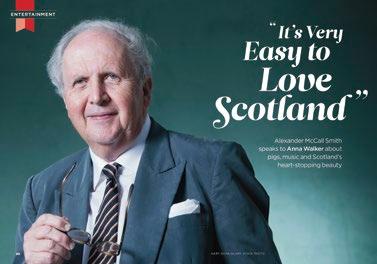
The interview with Alexander McCall Smith, “It’s Very Easy to Love Scotland”, took me back to the early 1930s, when I was a boy living on the Isle of Arran. My grandfather retired to Whiting Bay and lived in a large house called “Largymore”, in a village of the same name. I remember the piper who used to come up the drive, which was the signal for my mother to bring out the whisky for a wee dram or two. Grandfather would let me go shopping with him in the horse and carriage to the village. He never bought me a toy—the one I wanted was a little steamer in the shop, priced at one shilling and sixpence—but he would buy me an apple.
My wife and I have spent several lovely holidays in Scotland over the years, enjoying its beauty, traditions, its people and their warming suggestion to “haste-ye back”.
ALAN ANDREWS, Devon
I enjoyed reading “Linguistic Battle Cry”. Americanisms have taken over everything because we’re too lazy to invent our own words. I become annoyed at Countdown and the plethora of American words; prime culprit is the use of “high five” for any minor success.
Your article pleased me immensely and injected me with a bit of smuggery, as I force-feed people with English as it should be spoken. I cringe when I hear the word “brilliant” and ask if it means “brightly coloured” or “clever”, when really the user is using it to mean “mediocre”.
DAVID LLOYD, Hampshire
Regarding “Linguistic Battle Cry”, I have a few more Americanisms to add, all of which I find irritating:
“From the get-go…” Presumably this is a contraction of, “Get ready, get set, go”, and is used instead of, “From the start”, which is actually one syllable shorter.
“From the word go...” Often used by weather forecasters. Whose job is it to say, “Go”? Again, what’s wrong with “From the start”?
“Can I get…” Heard mainly in coffee shops and bars and used instead of “Could I have” or “I would like”. The correct response from the server should be, “No, I’m sorry, I have to get it for you.”
“Shout-out...” People used to ask for a mention on the radio, but now they ask for a shout-out. This is completely pointless, as invariably the DJ doesn’t shout at all!
DON MACKENZIE, ShropshireThe article “Putanse Intelligis, Mrs Sherridan?”, about doctors who love to appear clever by using Latin words, certainly made me smile. I think it applies to life in general, as those who have “the gift of the gab” are quite often successful in what they do.
Knowledge breeds confidence and is essential when exchanging information with others in the clearest-possible way. I’m not suggesting that politicians learn Latin to replace those platitudes— and would always insist on the truth—but rephrasing their answers with different verbal diarrhoea might just baffle our brains in a more positive way.
PETER FITZPATRICK, LancashireI was fascinated by “Seeing Double”. I always wanted twins but it was not to be. The nearest I got was two lovely sons with eleven months between them. Oh well! I thought, This is the next best thing.
Years later my daughter actually gave birth to twins and I was over the moon. These adorable little miracles led us all on a merry dance and I realised immediately that bringing up twins was a completely different experience—eyes in the back of the head, bionic arms and an endless supply of nappies, and that’s just for starters.
Anyway, I’d got my wish eventually—even though it was sort of second hand! PHILIPPA


Eileen Chatwin
www.authorhouse.co.uk
£8.95 sc | £2.99 eb
This is a true story about two Jack Russell’s who lived in Berskhire with the author and her children. Follow the dogs on their adventure with the family and meet some interesting animals along with them.


Ian Harding
www.authorhouse.co.uk
£17.99 hc | £9.95 sc | £2.99 eb


Gerry Casey
www.authorhouse.co.uk
£12.95 sc | £2.99 eb
Featuring an eclectic mix of proverbs, sayings, jokes, anecdotes, and poetry, Memories of Lurgan and Other Things pays tribute to the dialect and humor of Lurgan Town.


Gillian Fletcher-Edwards
www.authorhouse.co.uk
£17.99 hc | £9.95 sc | £2.99 eb
“Ian Harding contrasts the emotional highs of romance with the depths of heartbreak. . . .With its rare dual focus. . .this collection is a reminder that all relationships have a shadow side.”
--Rebecca Foster, Foreword Reviews.


Nick Weatherhogg
www.authorhouse.co.uk
£17.99 hc | £9.95 sc | £2.99 eb
Nick Weatherhogg, who has su ered from depression for years, explores battling depression, staying positive, and the causes and treatments for the world’s fastest growing health problem. He argues that, no matter how dark things may get, there is always hope.
A Collection of Short Stories incorporates storylines of love, modern problems, and personal experiences of a miner’s daughter. Author Gillian Fletcher-Edwards grew up in a mining family of the ’50s and ’60s, from which many of her stories grew.


Zambia’s President Edgar Chagwa Lungu’s Rough Journey to State House
Anthony Mukwita
www.partridgepublishing.com/africa
£25.95 hc | £11.95 sc | £2.95 eb
Against All Odds is about Edgar Lungu, an ordinary man who became President of Zambia. His twist of fate thrusts him into the sizzling national political spot-light into State House as the sixth president of Zambia.
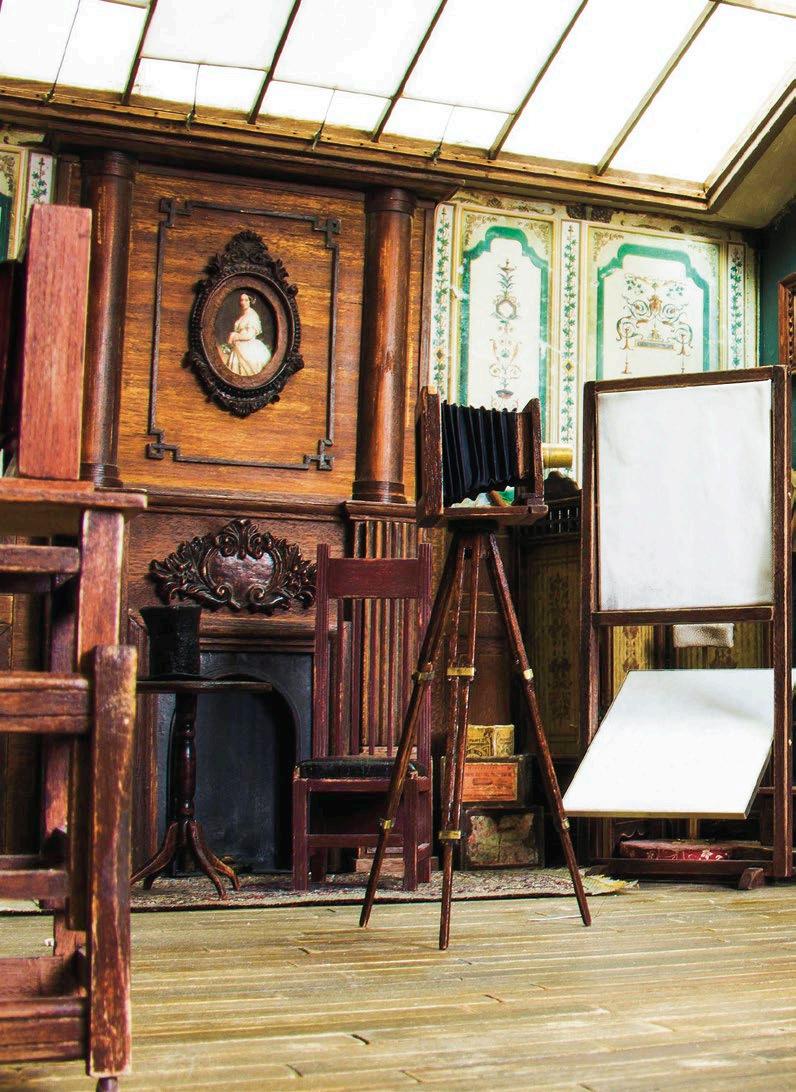
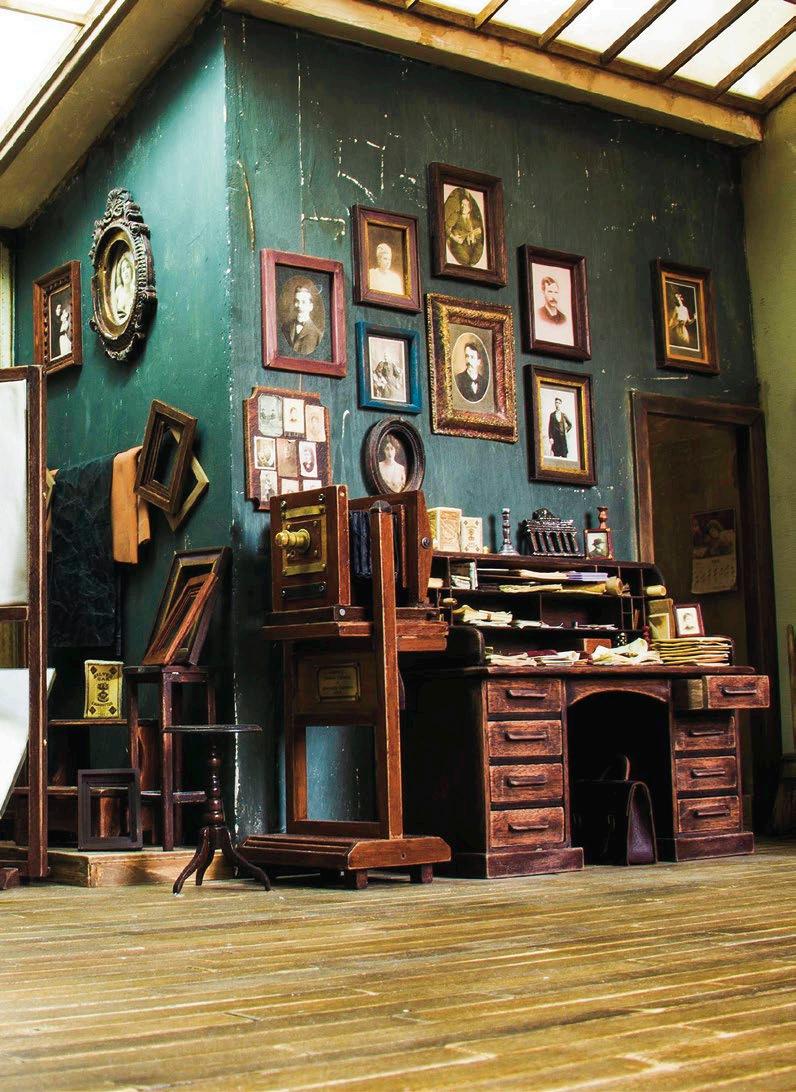
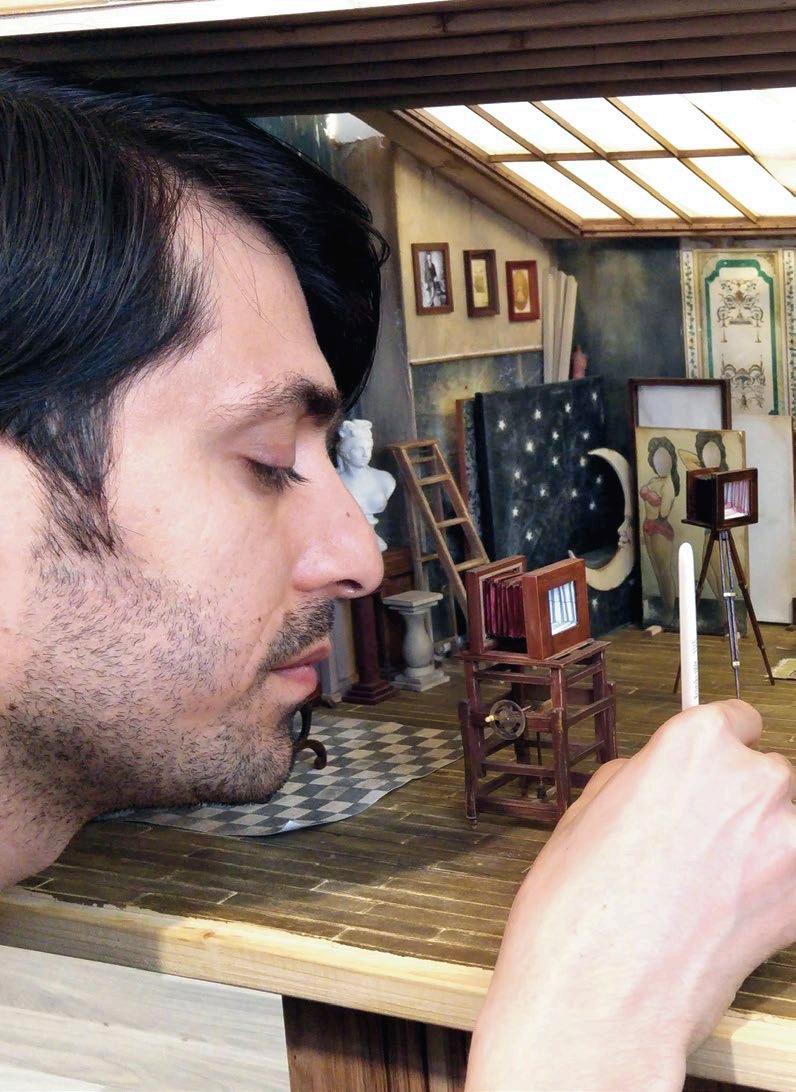
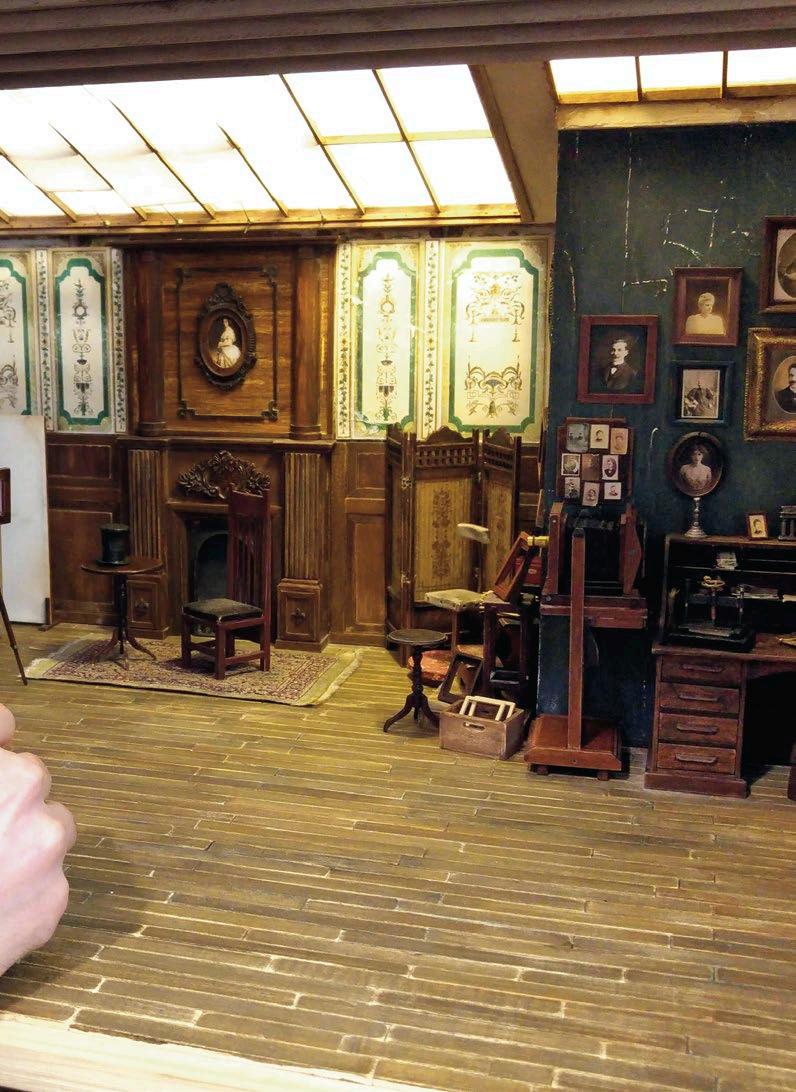
Only if you take a step back can you recognise what you’re really seeing with this early 20th-century photo studio: it’s an amazing miniature diorama!
Iraqi-born artist Ali Alamedy needed about nine months to transform the hundreds of metres of wood, plastic and copper into this tiny piece of nostalgia. Everything—including floorboards, camera equipment, and even the portaits on the walls—was created entirely by hand and, of course, completely from scratch.
When it comes to his underwear, Olly Mann is having a bit of an identity crisis

Olly Mann is a writer, radio presenter and serial podcaster, with shows including Answer Me This!, The Media Podcast and The Modern Mann
Would it be ok, dear reader, if i talk about my pants? After all, men’s pants don’t often get discussed.
Photoshopped billboards of sportsmen in budgiesmugglers aside, thinking about men’s pants seems eminently avoidable. Occasionally I’ll encounter a highstreet gangsta at the bus stop, wearing his jeans low (somewhere between posterior and ankles), and I’ll catch a glimpse of pant: Calvin Klein’s, usually.
Oh, and there was that funny clip of a city boy’s private parts falling out as he ripped his chinos dancing to Rihanna’s “Work”. I watched that online about 20 times. I would reckon his pants to be black cotton boxers. But, generally, I don’t think much about men’s pants.
i do remember ho W pants used to be, though. In 1986, my grandfather took me swimming—and, like every other septuagenarian in that brown-tiled health club, he was sporting Y-fronts. They were immaculately clean, as I recall, and baby blue; not the off-white, stained variety one associates with Bernard Manning or Homer Simpson. I believe Grandma ironed them.
Sadly it now seems that Y-fronts are comic shorthand for oafish laziness. As if the convenience of having a clearly signified “access flap” is somehow slothful, rather than an industrious design perfectly suited to the male form! Still.

I’m not here to mourn Y-fronts. I’m here to talk about my pants.
Back in that locker room in 1986, I was wearing briefs. Of course I was. Every little boy was. Mine were green, or they may have been red, or possibly
blue, but they wouldn’t have been black or white because those were grown-up colours.
It wasn’t an option to have Batman or Yoda emblazoned across them. It may have been in America—but in
North London, cartoon characters had yet to hit the pants market. By the turn of the century, we’d all become so infantilised it seemed reasonable for chaps with honours degrees and grandchildren to wear pants with South Park on them, but this was 1986: old men wore Y-fronts; middleaged men wore black or white briefs; and boys wore coloured briefs.
Ah, but what about young men?
Adolescents, teenagers, men in their twenties? That was simple, too: they wore boxers. So by the time I sprouted body hair, I followed the road map established by my adolescent contemporaries and went and got the best boxers I could afford (I opted for the nowdefunct high-street retailer Fosters. In modern terms I would describe this as a hybrid of Peacocks and River Island.) The pants were thready and irritable—but cotton comfort wasn’t my concern. The main thing was, I wasn’t wearing boy pants anymore, and I wasn’t wearing old-man pants. I was wearing youngman pants. Sexy pants. I had arrived.
This was 1986: old men wore Y-fronts; middle-aged men wore black or white briefs; and boys wore coloured briefs boxers.
I guess I’m of the generation that indelibly recalls the Levi’s ad with the ripped bloke in his crisp white boxers turning heads in the laundrette, legitimising reversesexism for decades (and, crucially, forgetting to wash his pants). Mind you, my average price per boxer has risen sharply over the years. I once went a bit mad in American Eagle and bought £100-worth (I was drawn in by the quirky graphics), and I’ve paid as much as £25 for a Saville Row pair (they were in the sale!).
but then, last month, I was absentmindedly considering my consumer habits, and realised most of them had swung upmarket. I used to drive a manual car, brush my teeth with a plastic stick and wear NHS glasses: now I drive an automatic, use an electric toothbrush and wear daily disposable lenses. And yet, my pants had remained unchanged, as it were. Had I researched the market? Had I considered which pants were best for my needs?
I never looked back. For more than 20 years since, I’ve continued buying essentially the same style of cotton
I went on a research trip to—where else?—Marks and Sparks. The range was bewildering. There were trunks (more support than boxers), sport
trunks (more shape at the bottom), hipsters (shorter and straighter), A-fronts (the acceptable face of the Y-front), and slips (I still have no idea). Trying to choose a pair was like backing a horse in the Grand National. I went hipster. Hoping for maximum comfort, I plumped for the Autograph variety.
Don’t worry, I’ll spare you graphic details, but suffice to say that, during the summer months, the support was most welcome—the lack of breathability not so. So I dabbled around with other brands and settled
on some other hipsters from Next, which seemed to better fit my requirements. (Also, as it turned out, my father-in-law wears Autograph hipsters from M&S. This was too much to bear.)
So tomorrow I’m going to throw away all my boxers: 30 pairs. I’m going to face the world, confident I’ve now upgraded to the right pants for me.
But I’m also going to have to confront the fact that, to that boy who bought boxers from Fosters, I may just have become middle-aged.
Mums and dads turn to Twitter to reveal the (questionable) joys of parenthood:
“I like having conversations with kids. Grown-ups never ask me what my third favourite reptile is.”
“Me: ‘did you have a good day at school?’ six-year-old: ‘that’s not how school works.’ ”
“You will never realise your full potential for speed and agility until the day you see your toddler holding a Sharpie marker.”
“In case you were on the fence about having kids, my three-year-old threw a temper tantrum because her tongue is pink.”
“What I thought I would say as a parent: ‘You are going to change the world.’
What I say as a parent: ‘Stop licking the window.’ ”
“the same kid who claimed she needs a fidget spinner because she ‘can’t focus’ just spent eight minutes picking every sesame seed off her bagel.”
SOURCE: S a D a NDUSE l ESS CO m


■ horror: The limehouse golem Move over, Jack the Ripper, there’s a new killer in town. It’s London, 1880. The people of the dreary and dangerous Limehouse district are terrorised by a bloodthirsty killer nicknamed “The Limehouse Golem”. When Bill Nighy’s relatively inexperienced detective John Kildare reluctantly takes over the case, the investigation takes him on a dark and confusing journey of murder, treachery and red herrings. Though not a horror per se (if you don’t take a dismembered body or two into account), but more of a juicy gothic thriller, The Limehouse Golem will please anyone with a penchant for Victorian London, the romance of stuffy old music halls and even a touch of kink!
■ history: vicToria and abdul Judi Dench is the intimidating Queen Victoria in this charming drama from the director of The Queen, Stephen Frears. In the late 19th century, a young Indian clerk travels to the queen’s Golden Jubilee. Much to his own surprise, he finds favour with the monarch and thus, an unlikely friendship is born. Funny, comforting and based on a true story, Victoria and Abdul is the quintessential feel-good film.
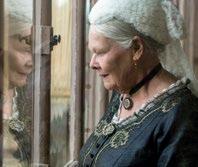
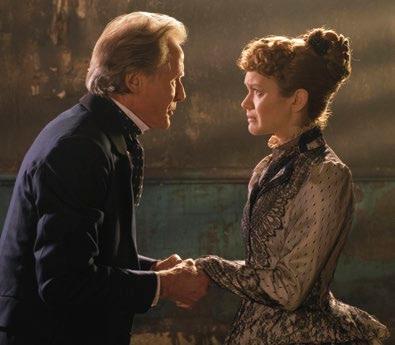
The role of John Kildare was initially given to the late Alan Rickman

■ action: kingsman: The golden circle In this punchy sequel to Kingsman: The Secret Service, the agents of Kingsman must join forces with their American counterpart, The Statesman, to defeat a common enemy. Full of elegantly choreographed fight scenes and panache, the film also boasts a galaxy of stars, including Colin Firth, Julianne Moore, Halle Berry, Elton John (who plays a fictionalised version of himself!) and many others.

■ Drama: una A young woman (Rooney Mara) confronts an older man (Ben Mendelsohn) with whom she had a sexual relationship when she was 13, in search of answers. This harrowing drama, which began life as a theatre play called Blackbird, is not an easy watch by any stretch. And yet, despite the gutchurning subject matter and some technical imperfections, it feels like an important watch—even if it’s just to throw your moral compass a curve ball.
■ comEDy: home again Alice Kinney (Reese Witherspoon) is a recently separated mum, raising her two daughters in Los Angeles. Her life drastically changes when she allows three young men to move in with her. Zany, familiar and warm, Home Again proves once again that Witherspoon can do no wrong when it comes to romantic comedy and reminds us how enjoyable they can be when done right. And that’s guaranteed when Nancy Meyers—the director of What Women Want and Something’s Gotta Give—is involved.

Watching: Poldark (bbc one) It has to be, doesn’t it? Sunday nights have never been so good!
Reading: on green dolphin street by sebastian Faulks

I have been steadily working my way through his books—he really is a superb writer.
Online: scottish book trust
They run a monthly 50-word fiction competition and I have been trying and failing to win it!
l istening: nursery rhymes
They’re on loop whenever we’re in the car—one of the many joys of sharing journeys with toddlers!
Fancy appearing in this section? Send your current cultural favourites, along with short descriptions, to readersletters@readersdigest.co.uk
native invader by tori amos

To know Tori Amos is to fall under the spell of her inimitable voice. Sultry and dynamic, it’s at the heart of everything she does. While the warm rasp seduces you with its alluring femininity, the histrionic pitchshifts make your stomach drop like a roller coaster ride. On her 15th studio album, Native Invader, Amos uses the magic of these vocals to channel Mother Nature and her ability to heal and renew through the cycles of death and rebirth. Sonically, the record mimics this subject matter beautifully: the soundscapes are mossy, echoic and buzzing with electronic loops, recalling crinkly forest floors and foggy mountain roads. But it wouldn’t be Tori Amos without the piano taking the spotlight; rich in hard-hitting, moody chords, it elevates the vocals to ecstatic heights. Together, they form a loving tryst, which makes the basis for such wistful ballads as “Breakaway” and “Bang”. The stuff of dreams, no less.
Key tracks: “Chocolate Song”, “Breakaway”, “Bang”

LikE this? yoU may aLso LikE... blue by Joni mitchell If Tori leaves you longing for more soulful singing and candid lyrics, why not turn to one of her biggest muses, Joni Mitchell? Her 1971 seminal album Blue is a treasure trove of deeply personal ballads and a favourite among fans and musicians alike.

On Our Radar base camp Festival in Derbyshire, september 7–10.
Relax in a cosy campsite after a day of hiking and wild swimming. Visit basecampfestival. co.uk for details.
bloody scotland Festival in stirling, september 8–10. Celebrate the best of Scottish and international crime fiction. Visit bloodyscotland.com for details.
newquay Fish Festival, september 8–10.
Feast your eyes and your palate as local chefs cook up a range of delicious Cornwall fish. Visit visitcornwall.com for details.
 © CHRISTOPHER BAINES
© CHRISTOPHER BAINES

Graham Norton has been a successful chat show host for two decades, and as Vicki Power discovers, no one seems more surprised by that fact than the man himself
“WE STARTED BACK IN THE SUMMER OF 1998, and if someone had told me 20 years ago that I’d still be genuinely excited about doing a show, I’d have said they were crazy,” says Graham, 54, over coffee at London’s Soho House.
“I
t’s because every single episode is different, and you can’t plan for what will happen on the night. I think the chat show is like a series of first dates. I love first dates, whereas fifth dates are like, ‘Oh, it’s you again…’ ”
We’re discussing Graham’s upcoming season in the host’s chair of the flagship BBC chat show that bears his name, which returns this autumn. After starting out as the saucy, flamboyant compere of Channel 4’s So Graham Norton and V Graham Norton, Graham left for the BBC in 2004 and has hosted The Graham Norton Show since 2007, gradually toning down his sauciness and wardrobe to rebrand himself as the nation’s statesman of chat. Each week he attracts Hollywood’s great and good alongside Britain’s biggest stars to his sofa for banter.
humour belie the ambition that propelled him to the top of Britain’s chat show tree. That same ambition that has perhaps also kept him single and unattached.
Does Graham feel he’s sacrificed a lot for his career? “Yes,” he says slowly. “Because it’s such a high-risk strategy, trying to find success in show business— particularly the kind of field I’m in, where I’m almost a parasite of show business. I’m the bird on the back of the hippo, not the hippo.
I think the chat show is like a series of first dates. I love first dates, whereas fifth dates are like, ‘Oh, it’s you again’
“Once you get there, you can’t risk losing it. If I have to tape on a Tuesday because that’s when Tom Cruise is in town, then I won’t go to my friend’s wedding. Happily, I’ve never had that happen, although someone reading this now will probably go, ‘You did do that! It was my wedding!’
Staying at the top of the showbiz tree for so long is testament to his tenacity and talent. Yet Graham’s relaxed persona and self-deprecating
“As far as I know I haven’t had that happen, but I dread that moment where I have to say, ‘I’m sorry. I’m working.’ It’s such a silly job—who really cares? But it does matter to the show, to the production team and to

the BBC that they get the biggest stars on their chat show, so it’s like, ‘I’m sorry, and I’ll buy you a nice present, but I won’t be there.’ And that’s hard.
“I wouldn’t say that I’ve made sacrifices for my career—I’d just say that I prioritise it.”
Graham adds that he doesn’t feel
that his career drive has prevented him finding lasting love, either, even though a previous boyfriend alleged it in a kiss-and-tell story earlier this year.
“I don’t think I’ve made sacrifices in my personal life,” says Graham. “I can’t think of anyone in my life where I think, Oh, if only I didn’t
Graham’s good friend Carrie Fisher gave her final interview on his show, just two weeks before her death

have this stupid career I could still be happily ever after with that person. I’m pretty much happily ever after with my own life now, rather than pining after the one that got away.”
INSTEAD, GRAHAM GOES ON DATES—“as I said, I really like first dates”—and hangs out with a close group of loyal friends, few of whom are famous. But one famous friend of many years was actress Carrie Fisher. Graham even took her as his plus one to Liza Minnelli’s wedding to David Gest in 2002. Carrie’s final interview
was on Graham’s show last December. She died two weeks later.
“Carrie didn’t seem well the night she was on my show. She didn’t want to come on,” Graham reveals. “She said, ‘I feel terrible and if it was anyone else, I’d cancel.’ But she perked up a bit after eating.
“When I heard later that she’d had a heart attack, that was less surprising to me. She wasn’t a well woman. But then for her to die! I still haven’t quite figured it out. It still hasn’t sunk in.”
When we meet, Graham has just returned from a long summer break
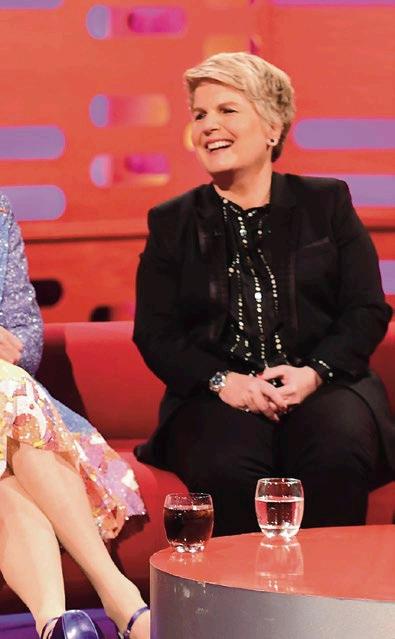
Carrie didn’t seem well the night she was on my show. She said, ‘I feel terrible, and if it was anyone else, I’d cancel’
novel Holding was well-received and a best-seller in Ireland, where it took the Irish Book Awards’ Popular Fiction Prize.
“I was thrilled, because I wanted to write a novel, but had no idea anyone would want to read it,” he



“Last year it was the novel, this year it was [BBC One talent show] Let It Shine, and next year will be the second novel.” Graham says he also fancies a bit of travel, although not for any extended periods that would
separate him from his two beloved dogs, labradoodle Bailey and terrier Madge.
He admits that he’s considering novel-writing full-time once he steps down from the chat show, although he stresses he has no time frame in mind for that yet. And, as he says, he’s still enjoying those “first dates” he partakes in each week with a new bevy of stars on his chat show sofa.
“Some nights I’m introducing the guests on the show and I look around me and think, Wow, this is my show and these people are on it,” says Graham with a laugh. “It really is incredible.”
The Graham Norton Show returns later this month on BBC One.
French photographer Diane Özdamar hopes to show rats in a new light:


SOURCE: BOREDPANDA.COM

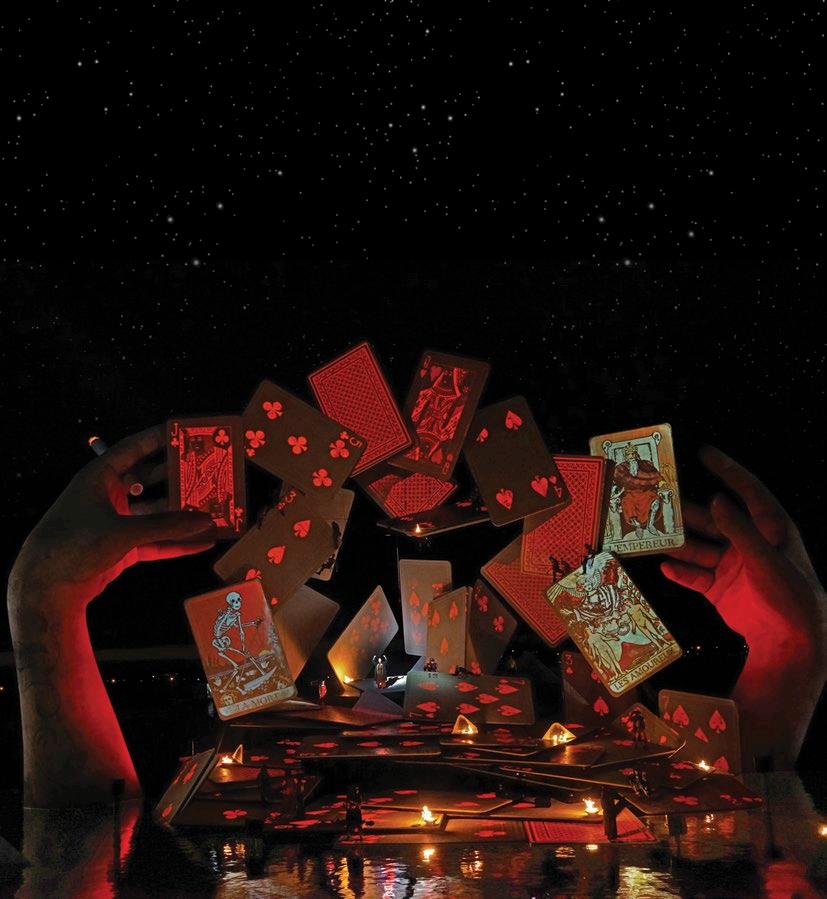

Jennie Bond, 67, is a journalist and television presenter. She’s best-known for working as the BBC’s royal correspondent for 14 years, and also appeared on I’m a Celebrity...Get Me Out of Here!
…WALKING DOWN THE GARDEN in Hitchin in Hertfordshire, when I was very tiny, to feed the chickens. We had a few chickens in a small enclosure in our garden, and I remember the excitement of looking for eggs.
…WE MOVED WHEN I WAS FOUR to Letchworth Garden City, the first garden city. This was a very exciting event because we were moving to a bigger house—a four-bedroom detached house with a very big garden. My mother, Pamela, lived there until two-and-a-half years ago and the garden was just stunning.
…PLAYING CROQUET in our back garden every summer. My father was very good at it. By the time she was 91, dementia was taking hold of my mother and she couldn’t walk very well, but she could still play croquet. She’s 95 now.
…MY FATHER WAS IN INSURANCE all his life, working in London. My mother would have been brilliant if she’d had a career, probably in the arts. In my view, she completely sacrificed herself by looking after us children and being a housewife. It was wonderful of her to do that, but by God, she had a brain on her that
 Jennie smiles for the camera at last year’s Chelsea Flower Show
Jennie smiles for the camera at last year’s Chelsea Flower Show
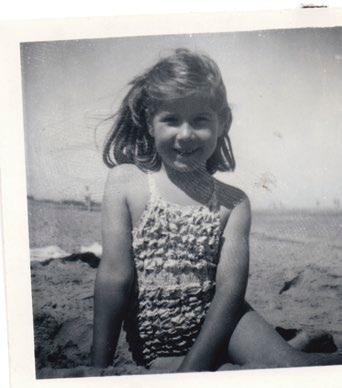

should have been used in a better way. We lived opposite the school, so us children would be back for lunch at 11.45am and then home at 3.45pm. Her life really was devoted to us.
but my parents really stretched their budget way beyond their means to buy this house. We were never poor, by any means, but mother made all our clothes and father grew many vegetables. On Christmas and birthdays, we’d have one present—not a whole load. And if there was a joint of meat, we’d get a decent helping but we certainly didn’t ask for more, as we knew the joint had to last for while. It was a reasonably frugal existence.
…A GREAT AND FUN ADVENTURE with my father and sisters was to go horse racing, which happened about four times a year. They were very special days; Huntingdon was about an hour and a half away and it was just so exciting to go there. Mother would make beef pasties—she’d make them on the morning of the races and they’d be wrapped in foil— and they’d still be hot when we got there. We were allowed to have a little bet—half a crown or two and six—and sometimes we won.
my whole life: Saint Francis’ College. It was run by nuns and was quite quirky. I had a Latin teacher called Sister Agnes, who was Irish. One day,
when I was in lower sixth, I went to my Latin class and she wasn’t there. They simply said, “Sister Agnes will never be here again.” Apparently she’d been seen running out of the convent, taking her habit off as she went, her red Irish hair streaming out behind her.
…THERE WAS ANOTHER NUN CALLED SISTER ELIZABETH, my English teacher at A-level. When I was at the University of Warwick, there was a knock on the door of my room on campus and it was Sister Elizabeth. I said, “I didn’t know you were here.”
She said, “Yes, I’m doing a postgraduate degree and I want you to meet someone,” and then introduced me to this bloke who was an ex-priest. She said, “We’re going to get married. Can you tell me where I get tights and underwear and what do I do with my hair?”
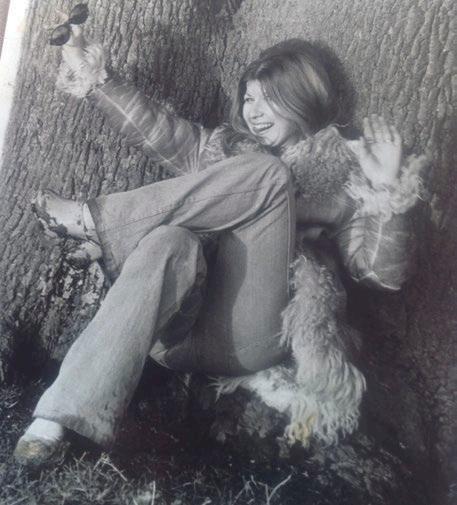
Aged 22 and just starting out on her reporting career, which she describes as a “baptism of fire”
So we went up to her room, I took her habit off, did her hair and told her where to buy things like knickers. It was all rather lovely.
…THE LOCAL NEWSPAPER WAS A BAPTISM OF FIRE. I was on the Richmond Herald, and the editor was a very eccentric man called Max Cuff, who had a big black moustache and dark hair. I’d just come out of university, having done French and
European literature, and was writing in quite a pretentious way, as I suppose you do in that academic way. I wrote my first piece of copy and gave it to Max. He tore it up in front of me and said, “Can’t you write in f*****g Anglo-Saxon?” And then he just kicked the waste-paper bin, and threw it in there.
…I HAD A FRIEND WHO IMAGINED news presenters just sit in a dressing room, in a dressing gown, waiting for the make-up artist before swanning
into the studio. I said, “No, you’re a working journalist, with the team. It’s just that you get to read the news.” You start on summaries, which are only a couple of minutes long—or they were then—and you have to get it right, to the second.
There’s sometimes great chaos in the newsroom; things aren’t ready and people are talking in your ear the whole time. You’ve got to divide your mind in two, as your mouth has to keep working while your brain’s listening to what’s going on.
…JILL DANDO AND I WERE WORK
COLLEAGUES more than friends, but we liked each other and we did hang out at the odd fashion show. She was a beautiful woman, very friendly, very generous and not a diva in any way whatsoever. She was enormously skilled and her star was rising—she was the go-to woman for everything on the Beeb, but none of that went to her head. She was an absolute delight. I was reading the news when she died, so I actually had to break that news.
…NEVER WANTING TO BE A ROYAL CORRESPONDENT. I wasn’t interested in the royal family. I insisted that I’d only do it for a year, but I ended up doing it for 14. It became a very important story, and that was largely because of Princess Diana. In fact, the Diana years were so tumultuous and catastrophic that
those 14 years often brought me to the top of the bulletin. People sometimes say it’s the frothy end of journalism, but it certainly wasn’t then—it was frontline reporting. It’s a difficult end of journalism, I think, because you so rarely get to talk to the people about whom you’re reporting in any sensible way.


…DIANA WAS AN EXCEPTION TO THE RULE, because I did get to know her. We’d meet and have long conversations one-to-one and
I was able to ask her everything. I don’t know if what she told me was the truth, though. It was her version—or at least what she wanted
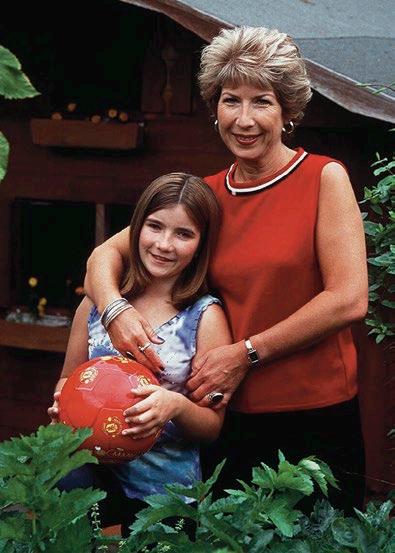
me to hear—about the state of her marriage, her own affairs, her boyfriends and of course her feelings about Camilla. She would answer all my questions, but it was her account of the facts.
…SCRUBBING THE FLOOR when the phone went. I had Marigold gloves on so I took one off, dripping wet, picked up the phone and there was this posh lady on the other end.
“Oh hello, Jennie, it’s Kensington Palace here. Just a message from the Princess—she wants you to know that you look very good in red and she thinks you should continue wearing red on television. Bye.”
…ON THE DAY DIANA DIED, I was in Devon, in our holiday home— which is now our permanent home— 250 miles from London. I was with our little girl, who was seven, and to whom I’d made a faithful promise that, “You’ve got your mum now for the next two weeks”, because I was always disappearing out of her life. And what did I do? I disappeared out of her life in the middle of the night.
I went up to London and it was a dramatic, traumatic seven days of reporting. My main memory of the day of the funeral is when it was over and the late news was off-air. I realised I’d completely lost control of my body temperature. One minute I was shivering and then I was boiling. It was a symptom of total exhaustion.
…SAYING GOODBYE TO THE BBC.
I decided to leave, almost on the spur of the moment. It was a combination of reasons, but really it was that I thought I’d done it all. I’d covered deaths, disasters, great fires, divorces and, after 14 years, I was done. Another main reason was that, as a family, we’d moved to our holiday home in Devon, and it was completely untenable to try and live
in Devon and work in London. It was out of the question for me to be away from my husband and daughter.
…I’M A CELEBRITY...GET ME OUT OF HERE! came along immediately after I left the BBC. I leapt at the opportunity and I thoroughly enjoyed the whole experience. I thought, It’s going to be a mid-life adventure. My daughter, Emma, who was 13 at the time, said to me, “Whatever you do, Mum, don’t throw up on TV.” So I just got it all down— stick insects, witchetty grubs, crickets and fish eyes.
It was a personal achievement that I—granny of the group, and with a public image of a stuffy old broad standing outside Buckingham Palace spouting posh stuff—was allowed to be myself, to be human, to wear shorts and no make-up and just
have a laugh. I came second, so stayed there till the end. It was lovely—and liberating.
…DAD DIED WHEN HE WAS 90. He was a lovely man. Shortly before his death, he said, “If I can leave this life having spread a little kindness, and I’ve done no harm, then I should’ve done well.” And I think that’s a good philosophy, because kindness, at times, is underestimated. It’s something that Diana really understood, you know—a little touch, a little look, a little hug, a little word, a little letter, a little note—it doesn’t take any time really. So I try to be kind. I mean, I can be a b***h, but I do try to be kind. As told to Joy Persaud
Jennie is the ambassador for ROL Cruise’s Cruise Miles Programme (rolcruise.co.uk).
A concerned dad turned to Twitter to garner some celebrity support for his son’s birthday, and to help the nine-year-old stand up against his bully.
The responses were brilliant:
Russell Crowe: “Hey Ollie, heard it was your birthday. Nine years old, eh?
Congratulations. Happy Birthday!”
Al Murray: “Hey Ollie. Chin up, mate, and remember—that bully is only picking on you because he knows you’re awesome and he isn’t.”
Dawn French: “Hello Ollie! I have decided that your official ninth-birthday new name is ‘Ollie the Mighty’. You cool with that?”
SOURCE: THEPOKE.CO.UK
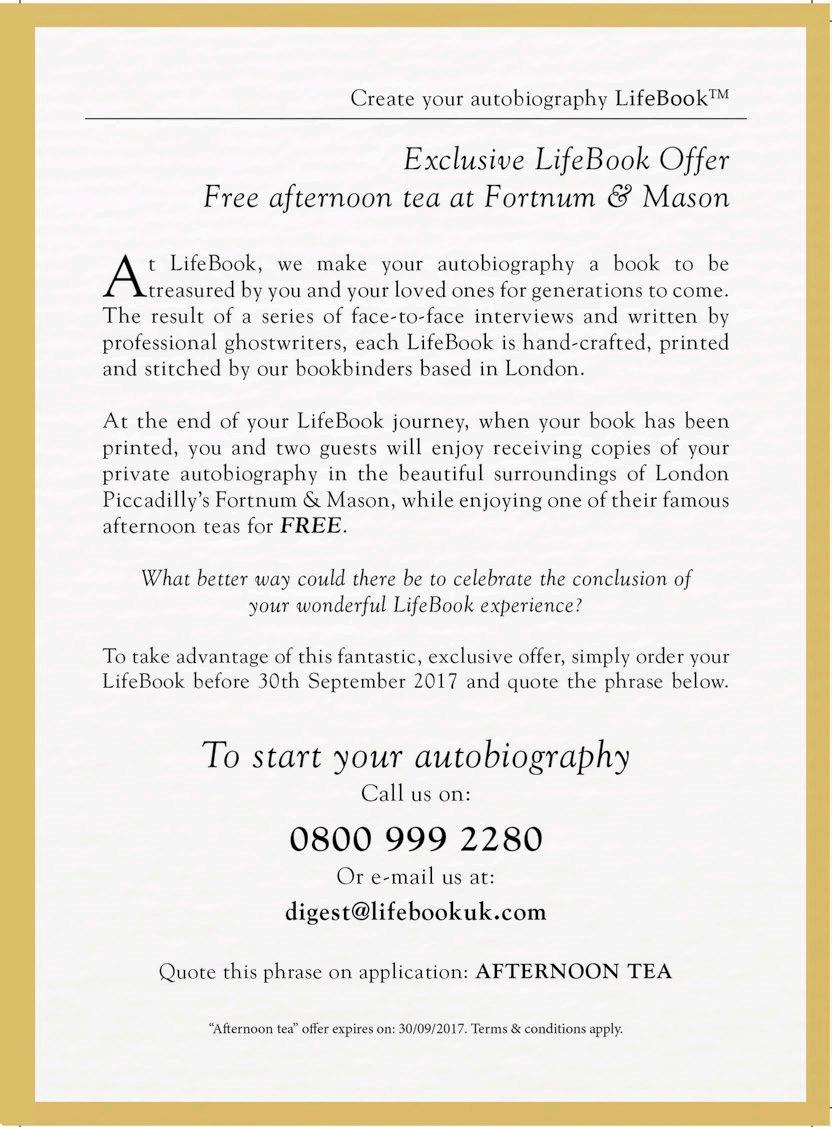
 BY LISA FIELDS
BY LISA FIELDS


sleep recently. I’d never had trouble staying asleep before, but my friend started texting at 2am to pass the time. I keep my mobile phone on my bedside table, so his texts disturbed me, even with the phone on vibrate—the buzz, accompanied by a lit screen, jolted me awake. Eventually, I activated a do-not-disturb setting: my phone remained blissfully silent and dark when I received unwanted texts between 11pm and 8am, and my sleep returned to normal.
Mobile phone alerts, bathroom trips or other causes spoil many people’s nightly rest. International guidelines suggest that adults should sleep between seven and nine hours nightly, but a survey of six countries,* including Germany and the United Kingdom, shows that about 40 per cent of us don’t get enough rest.
Chronic sleep deprivation isn’t just making us groggy; it can harm our health: research shows that adults who don’t sleep enough are more likely to be sedentary and obese, and they’re at greater risk of diabetes, heart disease, depression and common illnesses such as colds.
“Sleep is so important to physical and mental health,” says sleep researcher Neil Stanley. “Anything that causes poor sleep on an nightly basis is associated with risk factors for diabetes, obesity, depression and other problems. You have to look at things that you can do to improve the situation.”
*US, Canada, Mexico, Japan, Germany, UK. Source: National Sleep Foundation 2013 International Bedroom Poll
You don’t have to swear off coffee, rely on sleeping pills or buy a fancy mattress to get a good night’s rest. These offbeat tips may help improve the quality of your slumber:
Studies show that up to 60 per cent of adults keep their mobile phones in the bedroom at night. You’re more likely to stay up too late texting, emailing or using social media— then feel drowsy the next day.
“We know from research that using one app leads to another, so you’re likely to spend more time on your mobile phone than you intended to,” says Liese Exelmans, a researcher at the School for Mass Communication Research at the University of Leuven, Belgium. “People over 60 who use their mobile phones at night have a shorter sleep duration.” Older people are more likely to be morning persons, with a biological tendency to wake up earlier, or they may be required to rise early for work.
Sleep experts recommend against
bringing phones into the bedroom, but this is unrealistic for adults who use their phones as alarm clocks and who want to feel connected to friends through their devices. “Many people have a feeling that they’re disconnected from the real world if their phone isn’t in the bedroom,” Exelmans says. “It triggers hypervigilance. You’re not completely at rest, because you expect to be contacted sometime during the night. It’s the fear of missing out.”
of melatonin [a sleep-inducing hormone], telling your body to stay awake,” Exelmans says. Adding an app with a blue-light filter can help.
If you’re unwilling to part with your mobile phone overnight, minimise interruptions and encourage sleep by activating night-time blackout periods.

The blue light emitted by mobile phones inhibits melatonin output, telling your body to stay awake
Donny Soh, 38, of Singapore, experienced this phenomenon first-hand. When his company launched a new product last year, he’d wake up at all hours to see if anyone had placed online orders. “I would wake up perhaps three to four times per night,” says Soh, who admits that an attitude change helped him reclaim his slumber. “Regardless of how awake I am or how often I check my phone, it doesn’t really affect the sales, and since this realisation, my sleep has got much better.”
The blue light that smartphones emit can also negatively impact sleep. “The blue light emitted by mobile phones inhibits the output
“Keep it on flight mode, dim your screen and place it on silent mode,” Exelmans says. “Or remove some apps: Facebook, work email— it discourages you from spending time on it.”
Computers and televisions emit the same blue light that smartphones do. Best to keep computers and TVs out of the bedroom, and turn them off two hours before bedtime. And if you wake up in the middle of the night, refrain from turning to a screen. Says Exelmans, “Read a book, not a tablet.”
Is your night-time slumber
interrupted by urgent bathroom visits? You may have a little-known condition called nocturia, which awakens people from a sound sleep two or more times per night with the strong urge to urinate. As many as
three out of five older adults suffer from nocturia, which negatively impacts sleep.
“Even in people who fall asleep easily again,” says Dr Philip Van Kerrebroeck, professor of urology at Maastricht University in the Netherlands, “the interruption of sleep disrupts normal patterns and can have general health consequences: high blood pressure, diabetes. And it can have an impact on cognitive function.”
Nocturia isn’t a disease; rather, it’s a symptom of conditions such as sleep apnoea, male prostate problems and lower oestrogen levels in women. Many people assume that it’s a normal part of ageing—but this isn’t necessarily the case. Van Kerrebroeck says, “Sleep is a protective mechanism. An elderly individual has the right to a healthy life.”
Lifestyle changes may help: drinking no more than two litres of liquid daily, curtailing in the evenings; avoiding caffeine and alcohol for six hours before bedtime; taking diuretics in the morning or early afternoon, rather than later in the day; and elevating your legs.
When you put your feet up before bedtime, it pushes the fluids around your ankles back into the bloodstream, allowing you to urinate out the excess fluid while you’re
awake. If you don’t elevate your legs until you slip into bed, the excess fluid becomes urine while you sleep, leading to night-time awakenings. How long you’ll need to sit with your feet up depends upon your personal health. “With varicose veins or oedema, it may take longer for the fluid to return,” Van Kerrebroeck says. “It’s no problem to do it for two hours. For many people, half an hour might be too limited.”
A recent study from the University of Washington found that older women who practised yoga for two months reported considerably less insomnia. The gentle motions and poses may help reduce stress levels and improve blood flow, making it easier to sleep.
“Look for yoga in which the breath is really involved,” says Versaillesbased yoga teacher Laurence Maman. “By using exhalations rather than inhalations, you can influence the relaxation effect.”
The relaxation effect has been shown to lower blood-pressure levels, reduce stress and encourage sleepiness. Maman recommends practising yoga for 15–20 minutes before bedtime, choosing a lying-down position that
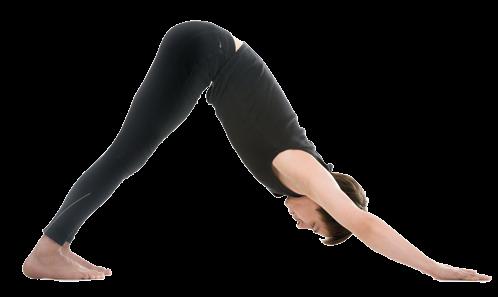
emphasises relaxed breathing. New Jersey resident Jodi O’Donnell-Ames knows this. When she turned 50 this year, she started waking up at 3am nightly, unable to fall back asleep. The long-time yoga practitioner turned to yoga for help.
“I used to practice power yoga more for cardio than for relaxation,” O’DonnellAmes says. “I added gentle yoga flow to my weekly routine. It took two weeks to see a consistent difference.”
Whether or not you have an emotionally fulfilling day may influence the soundness of your sleep.
retirement, children leaving home, and potentially bereavement and widowhood,” says psychologist and researcher Joanna McHugh of Trinity College, Dublin. “All of these events may create loneliness.”

Interacting with people during the day may improve sleep quality, but there are no exact guidelines
Researchers at the University of Chicago found that many people who are unable to sleep through the night feel isolated from family and friends. These people take longer to fall asleep at bedtime, and they’re more likely to toss and turn in the middle of the night, sleep for fewer hours and experience daytime grogginess more often than emotionally connected people.
Older adults are particularly susceptible to emotional loneliness. “Later life contains events such as
Interacting with people in a meaningful manner during the day may help to improve sleep quality, although there are no exact guidelines. “The link between loneliness and sleep quality is still relatively new and under-researched, so it’s hard to make recommendations,” McHugh says.
Seeing friends may make you feel more emotionally connected, and some research suggests that chatting with friends on the phone may provide ample emotional support—but texting and social media won’t cut it. Counselling may be necessary for some. “One can feel lonely despite being highly socially connected,” McHugh says. “It cannot be resolved purely by social contact.”
Falling asleep next to a snoring partner can be frustrating and tiring. Research shows that half of
sleep disturbances are caused by unwittingly disruptive bedmates. This can translate to chronic sleep deprivation, depression, heart disease and relationship problems.
“People who have poor sleep actually have a higher rate of divorce,” says Stanley. “The next day, you’ll have more arguments, be less likely to make up and have a lack of empathy toward that person. It’s a potential recipe for marital disharmony.”
relationship, you must share a bed or you’re calling into question your relationship. That’s utter nonsense.”
Want to try separate rooms?
Broach the subject in a loving, nonjudgmental way when it isn’t bedtime.

A simple fix: sleep in separate bedrooms. Researchers have confirmed that people get better-quality rest alone, which can positively impact your health and your relationship. “Sleep is the most selfish thing that you can do,” Stanley says. “If you’re sleeping alone, you’re not going to have somebody snoring, turning over or getting up to go to the bathroom.”
People get better-quality rest alone, which can positively impact your health and relationship
“It really is about saying that sleeping separately isn’t a withdrawal, that you’ll kiss and cuddle and when you say goodnight—rather than turning to the other side of the bed—you’ll go to the other room,” Stanley says. “People get sent to the back room or the couch as if it’s a punishment. But you say, ‘I want a good night’s sleep, so I’m going to sleep in the back room, but it’s going to be my room. It’s not going to be a punishment.’ If you do it in a loving way and you remain intimate, it works.”
About a third of married couples sleep in separate rooms, according to Toronto researchers. This trend has been slowly gaining momentum for a decade. “Talking about sleeping separately is probably one of the biggest taboos,” Stanley says. “Other people say that if you’re in a
What you eat and drink in the evening can affect your sleep quality. A heavy meal right before bedtime can cause stomach acid to rise into your oesophagus, which we know as heartburn, especially if you consume spicy foods, tomato-based products or chocolate. The burning, painful
symptoms of heartburn may keep you from falling asleep or may wake you.
Chronic heartburn may be a sign of gastroesophegeal reflux disease (GERD), which can cause serious problems over time. Lying down after eating may exacerbate GERD. Says gastroenterologist Dr Gary Falk, a professor of medicine at the Hospital of the University of Pennsylvania, “With lying down and going to sleep, one loses the defences of gravity, saliva and swallowing.”
To minimise reflux, stop eating two to three hours before bedtime and, to keep gravity working in your favour, consider raising the head of your bed.
Alcohol can cause reflux, and it’s also a diuretic—meaning you’ll have to pee soon after imbibing. And some drinks are worse than others. “Beer has an effect of stimulating the urine production,” confirms Van Kerrebroeck.
People sleep best when the bedroom is about 18C, according to research. Your temperature naturally drops as bedtime approaches, so keeping your bedroom cool helps your body adjust itself more efficiently.
“Warmth is a signal to the brain to stay awake for many people, says Ojile. “Throughout the night when it’s hot, you have this constant stimulation, which is wakepromoting. And there’s a tactile issue, too—some people have trouble sleeping if there are no sheets or comforters on them.”
Try keeping your thermostat at a cool temperature year-round. If your partner likes it warmer than you do, consider products that can keep you cooler than your bedmate, such as a gel pillow cover or a temperaturecontrolled heating-cooling pad that fits over only your half of the bed.
These are bound to make your mouth water (well, mostly):
The world’s largest chocolate bar weighed 912 stone.
Eating dark chocolate every day reduces the risk of heart disease by one third. But...
...a lethal dose of chocolate for a human is about one and a half stone— or 222 bars of Cadbury’s Dairy Milk.
SOURCES: GUINNESWORLDRECORDS.COM; LIVESCIENCE.COM; TELEGRAPH.CO.UK

Susannah is twice winner of the Guild of Health Writers
Best Consumer Magazine Health Feature

WITH A FEW SIMPLE STRATEGIES built into your daily routine, you can keep your grey matter healthy:
8am BRUSH WITH THE OPPOSITE HAND. Developing new brain networks can involve something as simple as putting your hairbrush or toothbrush in your non-dominant hand. Why? It challenges coordination and concentration.
9am DO SOME DOWNWARD DOGS. Morning sun salutations increase brain function. A 20-minute hatha yoga session is all it takes to improve focus and help you retain information.
10am PUT YOUR WATCH ON THE OTHER WRIST. Making this change demands more brain power than you’d imagine. It sounds simple, but just try it.
12pm DO A CROSSWORD OVER LUNCH. Word searches and puzzles are entertaining and they exercise your mind too, keeping the old grey matter firing.
3pm PRACTISE YOUR FRENCH. Download a language app and brush up on foreign phrases or learn a few verb endings. Bilingual people are better at


preserving their memory and problem solving as they get older.
4pm TAKE A COFFEE BREAK. Follow up your French lesson with a coffee. Studies have shown that people who have 200mg of caffeine (think a Starbucks cappuccino) right after learning something new have better recall when tested the next day.
6pm MAKE SALMON FOR SUPPER. Older people who eat seafood—at least two servings a week— have been found to have less Alzheimer’srelated damage in their brain.
7pm SIGN UP FOR AN EVENING CLASS. Whether it’s a cooking class or a history lecture, research has found that adults who took a college course boosted their cognitive capacity and cut their risk of developing dementia.
10pm HIT THE SACK AT A REASONABLE HOUR. A good night’s sleep helps both your ability to learn and your memory, research has found.
If you want to keep your brain active, keep your mouth clean.
But what do your teeth and gums have to do with your grey matter? A lot, quite possibly. A study from the University of Southern California found that elderly people who didn’t clean their teeth daily had a 22- to 65-percent higher risk of dementia than those who brushed three times a day.
Experts surmise that it could be down to harmful bacteria colonising your gums and their inflammatory by-products seeping into your body. That inflammation might then lead to conditions such as dementia and heart disease. It follows, then, that keeping your gnashers clean could help prevent this.
You could say that this all makes good dental hygiene a no brainer, really...

How best to rinse fresh fruit and veg?
n Wash greens in a colander under cold water.
n Rinse produce under running water for 30 to 60 seconds and give it a rub—no need to soak.
n Water on its own will do the trick. It’s perfectly adequate for washing off pesticide residues.
n Melons and oranges and other foods with nonedible rinds should be washed before you cut into them. Bacteria clinging to the outside can find its way inside.
n Wipe mushrooms with a damp cloth and gently pat dry with a towel.
n Scrub hard veg such as carrots and potatoes with a brush. Make sure you clean the brush afterwards too.

What do Napoleon, Elizabeth Taylor, Julius Caesar and Elvis Presley have in common? They all suffered from migraines. But as painful and debilitating as these headaches with sensory disturbance are, you can make a few quick lifestyle changes that may help you control them.
1. Stay hydrated. Aim for two litres of water a day.
2. Eat a good breakfast containing protein, such as eggs.
3. Don’t skip meals.
4. Have a healthy sleep routine, going to bed and getting up at the same time every day.
5. Exercise regularly.
6. Get plenty of fresh air and keep your home well ventilated.
7. Take regular breaks from computers, tablets and other screens.
8. Limit caffeine intake. That includes energy drinks, cola and strong tea, as well as coffee.
9. Cut out dyes, colouring, preservatives, artificial flavours and sweeteners from your diet as much as possible.
10. Go easy on the painkillers. Too many and you might develop medication-overuse headaches.










If you are looking for a daily supplement to give you extra support from within, Jointace® has been specially formulated by Vitabiotics’ experts to provide premium nutritional care. With a unique combination of nutrients, and vitamin C which contributes to normal collagen formation for the normal function of bone and cartilage. Also available, Jointace® Gel, an advanced massage gel designed to help maintain healthy joints and muscles.
Think you know all about hypertension? There are quite a few myths in circulation.
HIGH BLOOD PRESSURE HAS NO SYMPTOMS
FACT and FABLE. It’s true that you’re often not aware that you’re in the danger zone—it’s not called the “silent killer” for nothing. However, if your blood pressure goes dangerously high, you might have symptoms such as headaches, tiredness, pounding in the head, chest or ears, or chest pains. This requires urgent treatment.
THE BOTTOM NUMBER MATTERS MORE.
FABLE. Don’t think you’re off the hook just because the bottom figure—your diastolic blood pressure—is low. A high top—or systolic—number could still mean you have hypertension and need treatment.
YOU CAN SEE IT IN YOUR EYE
FACT. Opticians are able to see damage to the small blood vessels at the back of the eye—high blood pressure might have caused them to thicken, narrow or even burst.
ONLY STRESSED PEOPLE GET HIGH BLOOD PRESSURE
FABLE. It’s true that stress or anxiety causes spikes in blood pressure, but it should go down again when you relax. Other lifestyle risk factors include smoking, drinking too much alcohol and being overweight.

THAT’S HAIRY!
Recent research has linked grey hair to an increased risk of heart disease in men. While that’s not great news for men who go grey, it could be a useful warning sign.
Other research has suggested that white hair and dark eyebrows could indicate type 2 diabetes in men over 50. A bald head, meanwhile, has been linked to a higher risk of heart problems. What’s more, losing your hair has been associated with an aggressive form of prostate cancer.

While you can’t do much about your hair, you can do something to cut your risk of these diseases—by worrying about your waistline, not your hairline.

Imbue your favourite place to sit with warmth and comfort with a RugBuddy under-rug heater
Cold floors and air currents caused by wallmounted radiators leave many of us with chilly feet, but turning up the heating is not always the solution. Strong convection air currents from radiators are warm at ceiling level but turn into cold draughts at floor level, leaving your upper half warm and your toes icy.
If this problem sounds familiar, you will be relieved to discover the new Be Warmer “RugBuddy” heater, which tackles this problem feet first! The heater typically costs five pence per hour to run (varies with size) and provides warmth where you need it, under your feet.
Simply lay out the RugBuddy at the foot of your seat, cover with a rug, and plug it

Additional info
✚ Use on top of tiles, wood, laminate and carpet
✚ Wide range of sizes
✚ 'CE Marked'/ 'IEC Approved' quality


✚ 30-day “No Quibble” guarantee
✚ 2 years manufacturer’s guarantee
in. Within 20 minutes you will be enjoying a warm floor that radiates heat gently upwards and keeps you snug.
You may even find, with a RugBuddy keeping you cosy, that you save money on central heating. The independent Energy Saving Trust calculates you save £80 per year for every degree you turn down the central heating.
Head to BeWarmer.co.uk to get your very own RugBuddy and redeem an exclusive Reader’s Digest o er: Use code RDSEP17 for a FREE safety plug adaptor when you order a RugBuddy bundle (recommended) this September.
Right Rug Buddy by Be
Warmer

Fiona studies
Naturopathic Nutrition at the College of Naturopathic Medicine, and is a member of the Nutrition Society
FUNNILY ENOUGH, THE KEY TO REMAINING YOUTHFUL may lie in following age-old advice:
DO: START YOUR DAY THE OLD-FASHIONED WAY. Research shows that those who eat lower levels of omega-3 age more quickly, probably because these essential fatty acids are integral to many of our bodily processes. Oily fish is a rich source of these fats—so bring back kippers for breakfast.
DO: TAKE A DAILY CONSTITUTIONAL. A study of 2,000 women found that those with higher vitamin D levels had fewer age-related changes to their DNA—meaning they
Why eat it? The deep purple colour of beetroot comes from a pigment called betalin. Yes, it may stain your chopping board—but it’s forgivable when you learn that it helps your liver to detoxify harmful substances.
How to cook it? Why not grate some fresh beetroot and add it to your favourite salad? You can also steam beetroot for 15 minutes, and then enjoy it with lemon juice and olive oil drizzled on top.


could be ageing more slowly. The best way to boost your vitamin D levels is through safe sun exposure, such as a 30-minute walk in the open air.
DO: ENJOY A PRAWN COCKTAIL.
Prawns are a good source of astaxanthin—an anti-ageing antioxidant that’s 50 times more powerful than vitamin C. Try making a classic prawn cocktail with Greek yogurt (instead of mayonnaise) for a health-boosting starter.
DO: HAVE A CUP OF COCOA.
Research suggests that raw cocoa powder can help manage blood pressure and support your heart function. Mix some with good-quality milk for a comforting pre-bed drink.
DON’T: DRINK TOO MUCH.
The National Institute of Alcohol abuse and Alcoholism in the US warns that excessive consumption of alcohol may cause premature ageing of the brain. The odd glass of red wine, however, may bring benefits, as it contains the anti-ageing phytonutrient resveratrol.
DON’T: EAT TOO MANY SWEETS.
Proteins in your skin, such as collagen and elastin, are “glycated” in the presence of sugar. In simple terms, this means they bind to the sugars and become stiff and weak—leading to the development of wrinkles. Reduce your glycation and ward off sagging skin by cutting down on sugar and refined carbohydrates.

Max is a hospital doctor, author and newspaper columnist
THE WORLD OF MEDICINE THAT THE PUBLIC SEES portrayed in TV dramas is rather different from the real world of medicine.
What they don’t see are patients like Mrs Davies. That’s largely because they don’t want to see patients like Mrs Davies—and this sentiment is shared by my consultant. He’s been asked to visit her on the psychiatric ward, where she’s a patient, as she’s having problems with her bowels. “I bet there’s nothing wrong with her. I’m not seeing her. You go and see if she’s actually got a surgical problem,” he mutters.
This is because he can’t be bothered to make the tenminute trek out of the bright, shiny surgical wards to the other side of the hospital grounds where the psychiatric ward lies. In my experience, psychiatric wards are always in the most rubbish part of the hospital—as far away from all the “normal” patients as possible—and are always the last places to get redecorated or get new furniture. This ward is no exception.
MRS DAVIES IS SITTING IN HER ROOM with a few of her things lying around. It looks rather bare—in stark contrast to the surgical ward, it’s obvious that no one sends flowers or get-well-soon cards to someone with a mental illness.
She’s in her fifties and is wearing a cardigan with flowers embroidered up one sleeve. I sit down on a chair while she busies herself making me tea. To my great annoyance my consultant is right, and Mrs Davies doesn’t appear to have a
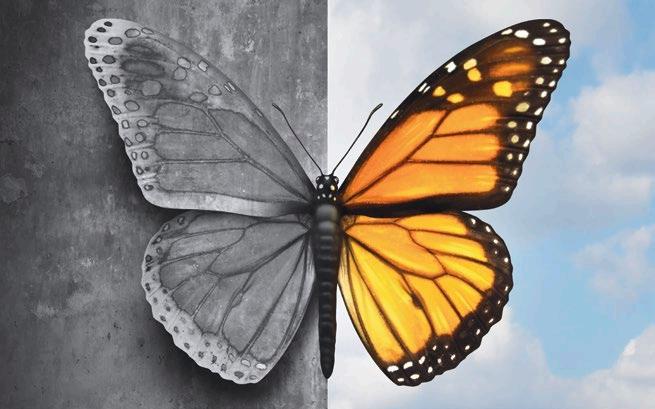
surgical problem—her constipation has resolved and been put down to her change in medicines. So instead I stay for a bit and we talk about art, films and what we’d do if we won the lottery. She’d buy a red ball dress and go to lots of posh parties, she tells me.
There are large cracks going up the yellowed walls. I’m not surprised half the people in here are suicidal. This place is dreary and obviously hasn’t had any money spent on it since Queen Victoria was around.
On my way to see Mrs Davies, I had to detour round the building works for the new wing of the hospital. On the billboards covering up the works are enormous pictures of sweet, doe-eyed children staring out to advertise the new paediatric ward due to be opened next year.
The public like the idea that their taxes are being spent on exciting, heart-warming things like helping sick children—and the consumer-led, media-savvy NHS are only too pleased be seen to be complying. When psychiatric wards are eventually refurbished, meanwhile, there’s no fan-fare, no grand openings, no photo shoots.
I SAY GOODBYE TO MRS DAVIES and walk back to the main hospital. “She was fine actually, nothing surgical to be done,” I explain to my consultant when I return. The ward seems even newer and brighter than ever.
“Who? Oh, her. I knew it,” he mutters and marches off. I hope one day Mrs Davies gets her red ball dress—perhaps then she’ll be seen.
Asthma is a very common lung condition that affects the airways and therefore affects people’s breathing. While it often starts in childhood, it can come on in adulthood too. For most people it’s a life-long condition. During an asthma attack, the muscles around the airways tighten and this causes them to become very narrow. At the same time, the lining of the airways swells and starts to produce thick mucus, which further makes it hard to breathe. This causes the main symptoms of asthma—difficulty breathing, wheezing, coughing and tightness of the chest.
Exactly what causes asthma isn’t clear. Factors such as genetics, air pollution and modern hygiene standards have been suggested but none are proven. We do know that asthma tends to run in families and people with a history of allergies, hay fever and eczema are more likely to have it. Common triggers for an asthma attack include mites, cigarette smoke, pollution and certain medications.

There’s no cure for asthma, but it can be controlled with medication. The majority of these are given through an inhaler: preventer inhalers (usually orange- or brown-coloured); shortacting reliever inhalers (usually bluecoloured); or a combination of the two (purple- or maroon-coloured).
If you have asthma, then ensuring that you have your inhalers on you at all times is very important. It’s also important to understand your triggers and avoid these as best as possible. Stopping smoking is also very helpful, as is taking regular exercise.
Smartphone technology is evolving every day, with an ever-increasing range of functions and uses becoming available from handsets.
For one manufacturer however, with all of the research and development into technical improvements, its most important evolution has been the addition of simplicity.
Doro, the world leader in easy-to-use mobile phones, has worked hard to make smartphone technology accessible to all— regardless of age or ability. The Doro Liberto® 820 Mini is a powerful smartphone, with all the functionality of the competition
Buy a new Doro Liberto® 820 Mini smartphone today, for the special price of £150—which includes an Anywhere SIM card connection and £40 of credit— allowing you to roam the UK with signal from O2, EE, Three and Vodafone.
PLUS, if you buy now, you will receive a protective cover for your phone (rrp £20) ABSOLUTELY FREE.
Simply go to readersdigest.co.uk/ mobilephones or call 03454 133 953 and quote “Reader’s Digest o er”.
on the market, but because of its simple and highly visual instructions, a smartphone novice will be able to do more, and at a quicker pace.
Large icons clearly identify where to find each function—from making a call, to sending a message or accessing the internet—the 820 Mini has a simple logic. It also has loud and clear sound, and is hearing aid compatible.
In addition, for each of the main functions, there are step-by-step guides built into the phone to help the new user get familiar with the technology at their own pace.













It’s not always easy to spot, but anti-terrorist architecture is becoming more and more common around the world
Terrorists tearing through bridges, markets, holiday resorts, concert venues and bars has become all too commonplace.
It’s the stuff of nightmares, made worse by the ease with which regular vehicles can be turned into lethal weapons. Indeed, the so-called Islamic State (ISIS) describes 4X4s as their weapon of choice.
Of course, the police and intelligence service are already working tirelessly to counter these threats, but they’re not the only ones. Behind the scenes there are quieter heroes too—the designers who are trying to keep us safe through architectural ingenuity. They’re the professionals who are adding safety measures to our landscapes— precautions hidden in plain sight in the guise of planters, benches and lamp posts, everyday street furniture that’s tested to withstand the force of a hurtling truck.
Walk past the Palace of Westminster and you’ll see large black barriers engineered to halt a lorry from striking at speed. Stroll further along Whitehall, the home of many government ministries, or to the north side of Parliament Square, and the barriers disappear.
Court Road, there’s a massive ovalshaped bench—it too is a barrier in disguise. Smack a van into it, and the vehicle will come off worse.
But it’s not just the capital that benefits from these hidden features. The seats on the approach to the Welsh Assembly are reinforced, and so are the nautically themed benches outside the Titanic Belfast Museum.
THE AIM IS TO PROTECT WITHOUT MAKING IT FEEL LIKE A SECURITY ZONE
This isn’t a security oversight. The area is still protected, but here the barriers have been seamlessly designed into the landscape. You’ll pass what looks like a classic balustrade wall, something that might have been there for centuries. It hasn’t. It’s a modern intervention packed with reinforcements to prevent a hostile vehicle attack.
On London’s busy Tottenham
Birmingham New Street station—once voted the “ugliest building in Britain”— recently underwent a revamp that not only gave it an attractive mirror-polished stainless steel facade, but a robust “Hostile Vehicle Mitigation” (HVM) system. The building is protected with massive stainless steel planters packed with impressive trees. There are also counterterrorism blocks around the taxi rank, and within the public plaza masquerading as seating. Visitors use them on a daily basis, unaware of their dual purpose.
The aim is to protect people without making them feel that they’ve entered a security zone, explains Jonathan Goss, counterterror and vehicle-security specialist, and managing director of Townscape Products, who designed the New Street and Titanic Belfast projects.




“There’s a danger that HVM systems that are obviously installed to provide security will create further civilian unease by making people feel as though they’re living under constant threat of attack. As such, it’s essential to take a holistic approach to perimeter protection. By taking a long-term preventative view, it’s possible to ensure the correct level of protection while enhancing the aesthetics and functionality of public spaces.” Turning protective concrete blocks into planters is also a way of bringing more greenery into our urban spaces.
But this idea of combining safety and aesthetics is not entirely new. Outside Arsenal’s Emirates Stadium, which opened in 2006, are giant concrete letters that spell out the
club’s name. It looks like a quirky design feature, but it’s actually a massive shield to absorb energy in the event of a hostile vehicle attack. Concrete benches and giant ornate cannons (part of the club’s insignia) on the forecourt provide further protection, making it difficult for a vehicle to weave through.
STREET PLANNERS AND ARCHITECTS have been thinking about security enhancements for some years now. In 2010, The Royal Institute for British Architects produced guidelines urging planners to incorporate anti-terrorism measures into building design.
Hence the steps up to the new northern entrance at Reading Station force crowds to gather not by the building entrance but above the
tracks to lessen casualties in the event of an attack.
“You can’t just have your gate and drawbridge, you have to have other accesses,” says Victor Callister, deputy director of architecture and built environment at the Design Council.
Callister says terrorists are known to scope buildings for vulnerabilities, and will be put off by good design. Indeed, good counter-terrorist design already has a history of thwarting attacks. In 2007, terrorists rammed a Jeep Cherokee loaded with propane canisters into the glass entrance doors at Glasgow airport, but security bollards stopped the car from entering the terminal. “Had the vehicle entered and the canisters detonated, hundreds could have been killed or injured,” says Richard Roberts, senior consultant of security firm SGW.
been unable to drive his truck so close to the building, it’s very unlikely he’d have caused so much destruction.
For security reasons, counterterrorism experts won’t reveal which buildings have been scoped and abandoned as potential targets.
“The design work in this area is seen as successful if it’s integrated and under the radar,” says Graham Stallwood, chair of the Royal Town Planning Institute’s board of trustees.
He says lessons have been learned from other attacks too, especially the 1995 Oklahoma bombing, in which white supremacist Timothy McVeigh detonated a truck containing over two tons of explosives directly in front of a federal building, killing 168 people.
“This attack highlights the immense devastation an attack on a site with no blast stand-off can cause,” says Roberts. Had McVeigh
It may explain why terrorists have recently turned their attention to public places—such as concert venues and markets. Between 2011 and 2015, some 42 per cent of attacks were on soft targets—those which are unprotected or vulnerable. The figure was just 26 per cent between 1998 and 2010 (according to think tank, The Henry Jackson Society).
Clearly the need to protect soft targets is greater than ever. The challenge is to do this in ways that don’t brutalise our environment.
Security expert Richard Roberts says turning our public spaces into military zones would essentially be a victory for the terrorists, “as it changes the perceptions of how we live and how safe we are.” The ultimate goal,
Bronze bollards in New York’s financial district are both beautiful and functional


says Roberts, is to create security features that seamlessly blend into the general environment.
THE BALANCE BETWEEN AESTHETICS and public safety is evolving. The shape and design of most bollards stem from 18th-century maritime history (with a domed top like a
cannon), but that’s now changing. These days, some bollards could be mistaken for works of art.
Amble through New York’s financial district and you’ll encounter a series of multifaceted bronze bollards that double-up as benches, and look like sculptures. They’re the brainchild of architects Rogers Partners, who were tasked with implementing permanent security features around the New York Stock Exchange. The design had to include an “anti-ram element” but couldn’t ruin the appearance of the area.
The resulting barriers shimmer in the sunlight, and are set at a perfect height for sitting, leaning or tying your shoes. They couldn’t be further
in appearance from the stark concrete blockades that might so easily have been used. What’s more they’re incredibly strong, having undergone live testing to gain New York Police Department counter-terrorism approval.
In the UK, counter-terror bollards undergo similarly rigorous checks. Security expert Marcus Gerrard, of hostile vehicle mitigation specialists Safetyflex Barriers, watches heartin-mouth at the Motor Industry Research Association’s crash centre, as a truck ploughs into his products at full pelt. To pass, the barrier must annihilate the vehicle’s whole front engine, and still be operational afterwards.
truck-ramming attack on Bastille Day in Nice, Gerrard arrived in France to pitch another of his products— specially designed steel bollards that spring back and forward like a jackin-a-box, strong and flexible enough to repel tons of fast-moving metal. These barriers absorb kinetic energy on impact so the vehicle simply bounces off.
“They said, ‘We don’t see a terrorist attack happening,’ ” says Gerrard, who believes his products would have withstood the impact at Nice.
“It’s tense watching your product get tested. The truck is pulled on a winch and is capable of going from zero to 50mph in about two seconds. It costs around £50,000 per test, and there’s no guarantee you’ll pass, but I enjoy the challenge. I set up the company with my father, Robert. I get a great sense of pride working on sites all around the world.” His latest offering, “Crash Block 40,” looks a bit like a metal picnic bench, except it can stop a speeding 7.5-ton truck.
Just two years before 86 people were killed in the catastrophic
After a succession of atrocities, calls now flood in from across the globe.
IN THE AFTERMATH of the Manchester Arena bombing, and a series of ram attacks in London, including on Westminster Bridge, London Bridge, and outside Finsbury Park Mosque, the government’s National Counter Terrorism Security Office has issued updated “Crowded Places Guidance”. Although not mandatory, good counter-terrorism design is a key feature of the report. In these uncertain times, there’s something quietly victorious about the idea that people, armed with nothing more than brilliant ideas and a pencil, might just be the ones to save the day.












I spend £2 a week on the lottery and just £1 a week on my funeral








You don’t have to trust luck if you want to leave a cash sum for your loved ones. One sure way is the Guaranteed Over 50 Plan.
From less than £4 a month – one of the lowest fixed premiums for a plan of this type – it could be just the ticket. And, if you’re aged 50-85, we guarantee we’ll accept you – no medical, no health questions asked.
As long as you continue to keep up your premiums, after you’ve had the plan for two years, we’ll pay out a fixed cash sum on your death. If you were to die in the first two years, we’d return all the premiums paid, plus half as much again. That’s unless you were to die as the result of an accident, when we would pay out the full cash sum.
When we say guaranteed, we mean it –so unlike the lottery, you know exactly how much will be paid out. Just bear in mind that inflation will reduce the value of your fixed cash sum over time. You should also be aware that, depending on how long you live, you could pay in more than the cash sum paid out. All we ask is that you keep paying your premiums for life. If you stop, your cover will end and you won’t get anything back.
Cover provided by AXA Wealth Ltd.
Great reasons why more people choose SunLife
FREE £75 gift card
FREE £300 Funeral Benefit Option
First month FREE!
UK’s most affordable
UK’s most popular**
It’s your funeral – who’s going to pay?
You may be surprised to know that the average cost of a funeral is £3,897,‡ and that’s likely to rise in the future. Paying less than £4 a month won’t cover all of your funeral costs, but it could help if you’re worried about leaving your loved ones with the bill.
Finding out more couldn’t be easier. So why not call our UK call centre today to request your free information pack. We’ll also send you a free pen, just for enquiring.
As a thank you for taking out a plan, your first month’s premium will be FREE and you’ll get a FREE £75 gift card.
‡Source: Average of quotes for standard funeral arrangements from a sample of funeral directors. SunLife Cost of Dying Report, June 2016 (Critical Research). **Most popular whole of life guaranteed acceptance plan bought directly. ABI statistics – 12 months up to 31.12.2016. †Amazon.co.uk is not a sponsor of this campaign. For complete Gift Card terms and conditions, see www.amazon.co.uk/gc-legal. All Amazon ®, ™ & © are IP of Amazon.com, Inc. or its affiliates.
SunLife Limited distributes financial products and services and is a company limited by shares, registered office: 1 Wythall Green Way, Wythall, Birmingham, B47 6WG (registered in England, no. 05460862). SunLife Limited is authorised and regulated by the Financial Conduct Authority and is entered on the Financial Services Register (registration no. 769427).


























One of the most successful Irish novelists of all time, Marian Keyes, 53, has sold over 30 million books. In 2009 she experienced a major depressive episode and had to stop work—baking cakes to help her heal
When meeting someone for the first time we’d ask what they like, not what they do. That’s a far more humane way to get to know each other. We’re complex and interesting creatures and asking someone about their job implies that we’re judging them on their income or validity in the workforce.
Women would have 50 per cent of management positions. Until we stop labelling women as the primary caregivers for children, men aren’t going to step up to an equal parental role. It’s this disparity that perpetuates gender inequality in the workplace. I’d make paternity leave mandatory and companies would have to be representative of the human race; equal men to women right from the top.


I’d sort out airports. They’re terrible places. People walk at the wrong speed, eight abreast with wheelie cases, dithering around. I’d introduce little sticks to

carry—you could hurry people along with a tiny electric shock so they’d jump out the way. Also, there should be hard shoulders so people who wanted to check their phones could pull in and stop blocking my purposeful route. Look what’s happened to me ruling the world— I’ve turned into a megalomaniac!
The government would provide fixers to come to our homes. You know all those annoying things that need doing but aren’t big enough to call in the plumber or decorator for? Like changing tricky halogen bulbs or getting rid of very high cobwebs? Think how happy we’d be if, once a week, someone called round and sorted stuff out. Partners can be helpful but if you live on your own, then it would be great to have a fixer in your life.
Each day we’d be kind to a stranger. It makes the world a better place when, out of the blue, someone helps you or even just smiles at you. And the funny thing is, it makes the giver feel even better than the recipient. So next time you’re in the coffee shop, why not buy the person behind you a cup? Even the smallest acts of kindness will help you feel more connected to the human race.
Children would be read to more. I think there are two things that help make children feel grounded and
balanced: the first is sitting down to eat with their family round a table, and the second is being read to. I was read to every night and I still remember how safe it made me feel before I went off to sleep. I learned the value of imagination and the power of words.
I’d really like to sort out the refugee crisis. There are 65 million refugees, asylum seekers and displaced people waking up today in a place they would rather not be. It cripples me with sorrow. They’re no different from you and me, with the same human rights, yet they’re living a half-life, sometimes stuck in tented camps for years. I don’t have the answers but in an ideal world they’d be welcomed into different countries and cared for.
Real people would answer phones. Recently I had to renew my car insurance. First came the multitude of options, then being told my call was important and promptly being put on hold forever. Then came the beautiful moment when I was seconds away from talking to a real person when I was cut off. All that hope and wasted time—it’s enough to break a person. What happened to “Hello, I’m a helpful person, what can I do for you?”
As told to Caroline Hutton
The Break by Marian Keyes (Penguin, £20) is out on September 7.
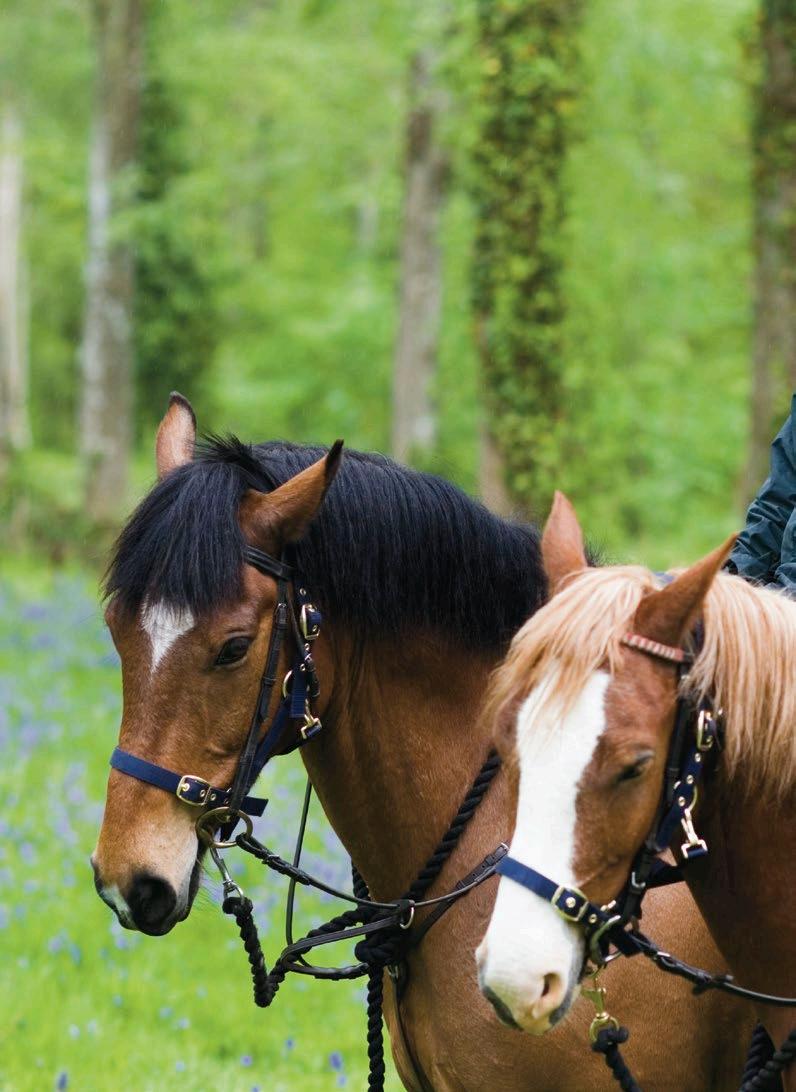
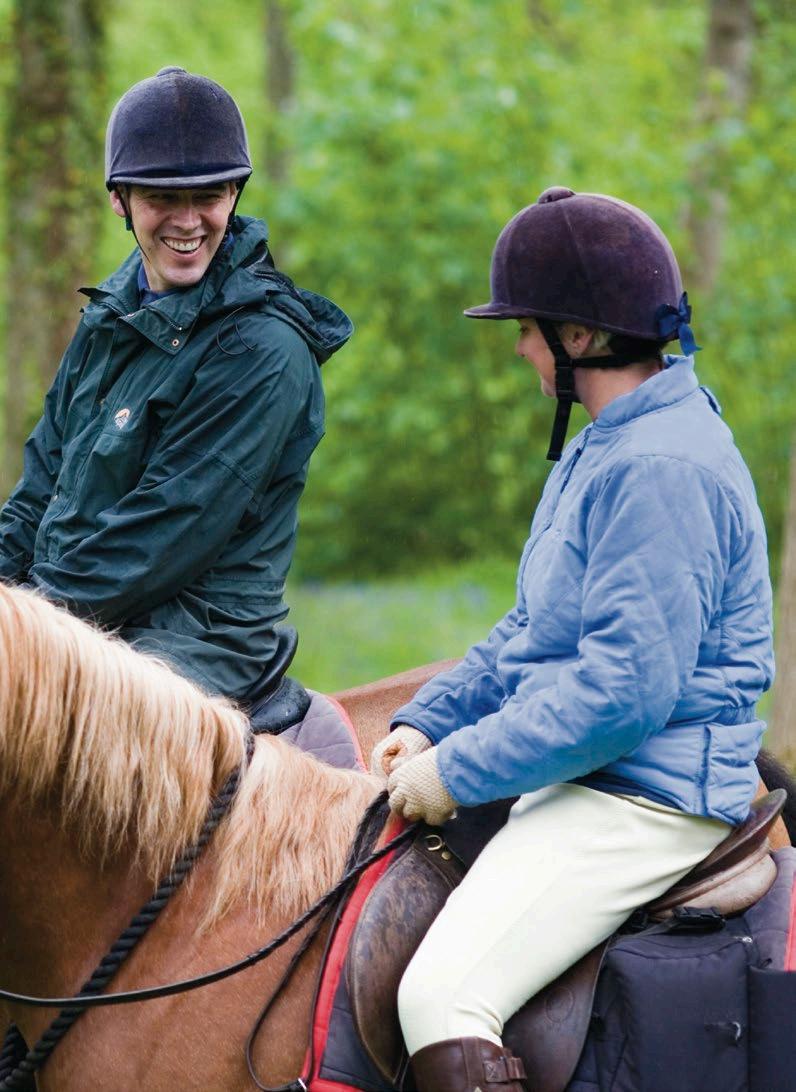
Riders enjoy some camaraderie as they ride through Brecon Beacons National Park
Transwales has a herd of about 60 Welsh cobs, nearly all of which were bred on the farm

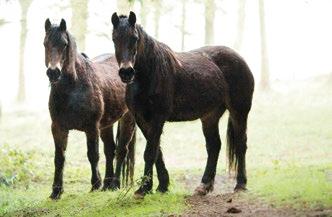
TRANSWALES, BRECON BEACONS
“There’s nothing better for the inside of the man than the outside of a horse,” said Ronald Reagan. Follow in the hoof-steps of the former US president and look to a four-legged friend for some serious R&R.
TransWales offer full-board retreats around the National Park, where riders encounter breathtaking views of the Black Mountains, moorlands, thick forests, valleys and pasture.
Visitors are matched with their horse based on their ability and experience, so whether you’re riding with the handsome Willy Nilly, gentle Hank or “the orange elephant” Neptune, these sure-footed horses will ensure you’re comfortable and in control.
After you dismount, prepare for traditional Welsh hospitality at the family farmhouse—think log fires, cosy beds and delicious home cooking. You might even get a taste of their very own Black Mountain lamb!
■ Visit transwales.com for more information
Searching for true escapism? Where better than a historical hotel that was nicknamed “the enchanted place on the hill” when it was originally built in 1640?
Carrying the coat of arms of King James I, the Elizabethan Boringdon Hall has hosted guests looking for a place to escape and unwind in style for centuries.

Stretch out with yoga sessions on the lawn and refine your downward dog in expert classes. The retreat also includes breathing workshops, spa treatments and silent meditation walks in the surrounding Dartmoor countryside. There’s even a pool for gentle swims during your free time. The spa’s director, Shelley Hepburn, enjoys offering guests the chance “to recharge in natural surroundings, and embark on an enlightening weekend of yoga. The choice of modern or traditional therapies from our spa helps guests to relax in mind and body, so they can leave feeling refreshed and revitalised.”
■ Visit boringdonhall.co.uk/gaiaspa for more information
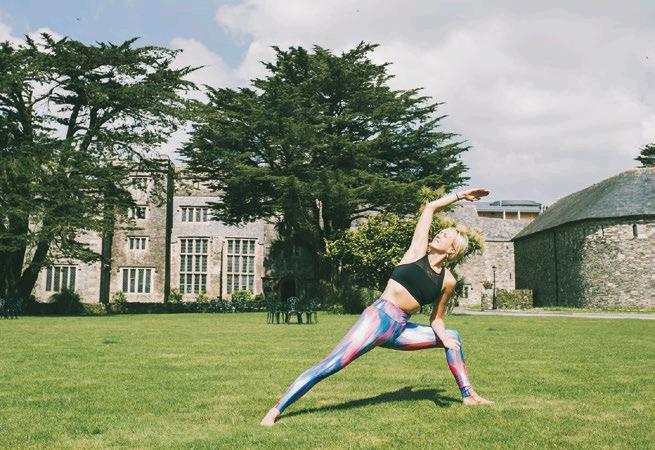
Love nothing more than a glass of wine to help you de-stress? Then you can only imagine the calming effect of staying in the grounds of England’s largest vineyard. Located on the outskirts of Dorking, an impressive ten per cent of English wine is made on the Denbies estate.
Guests while the hours away learning about all stages of its production, from vine to bottle. Enjoy guided walks through the vineyards, or get cosy with tasting sessions in the atmospheric wine cellars.
Says chief operating officer Jeanette Simpson, “One of the highlights is identifying where certain wines have been produced on our expansive grounds. A specialty of Denbies is our dessert wine, Noble Harvest. It’s grown on a specific parcel in the vineyard and it goes particularly well with the local cheese, Norbury Blue.”
■ Visit denbies.co.uk for more information

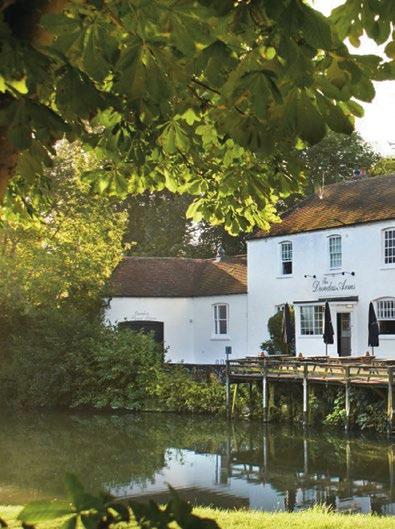

THE DUNDAS ARMS, BERKSHIRE
Poet Ted Hughes claimed that fishing “gives you some form of communion with levels of yourself that are deeper than the ordinary self.” This retreat offers that in reams.
Built in the 18th century, the enchanting Grade II-listed Dundas Arms is full of hidden nooks and
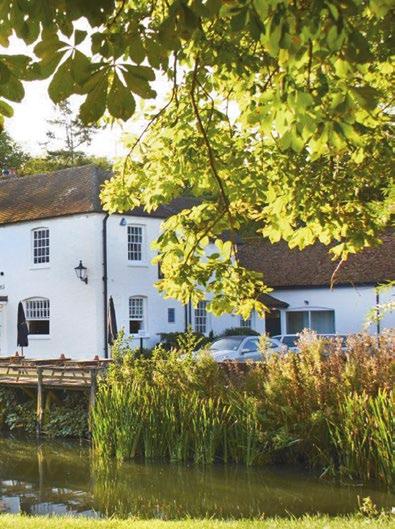
crannies and surrounded by water on both sides, ensuring your mind is on the river from the moment you arrive.
The River Kennet swells with a healthy stock of brown trout, rainbow trout and grayling, making it an ideal spot for fly-fishing. Strike out solo or work with experienced guides.
Fishing is hungry work, so satisfy your appetite between catches with gourmet picnics of cold meats, cheeses and hot smoked local trout before a celebratory evening dinner in the Dundas Arms restaurant.
■ Visit dundasarms.co.uk for more information
Hosted in the former home of playwright John Osborne, The Hurst is nestled between the forest-covered Shropshire Hills, boasting Redwoods and orchids in its 26-acre grounds.
As well as open-ended writing retreats, the courses on offer cover fiction, non-fiction, screenwriting, poetry and radio drama. Appearances from guest writers offer welcome encouragement—their impressive roster of former tutors includes Ali Smith and Malorie Blackman.
Says recent guest Sadie, “The rural setting and amazing surroundings jerked me out of my usual I-don’thave-the-time mind-set, and left me feeling free of pressure, stress and hurry—it was completely liberating.”
And if writer’s block strikes? Simply take a walk around the lake, reflect in front of the real log fire or—even better—decamp to the nearby pub.
■ Visit arvon.org/retreats for more information
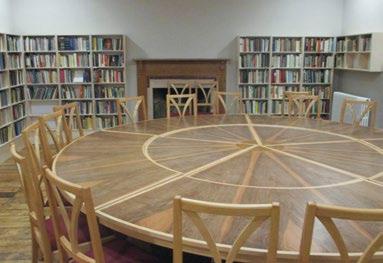
Every artist needs their inspiration, and backdrops don’t come more awe-inspiring than this. The homely Glenreasdale House features a tower, walled garden and stunning views over West Loch Tarbert.
Just two hours’ drive from Glasgow, it’s situated in a uniquely undulating landscape between the ferry port of Kennacraig. When it’s raining on the east side, there can often be bright sunshine on the west.
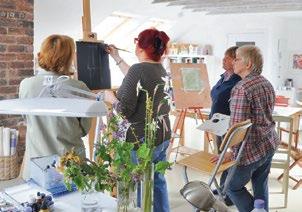
Spend your days painting in the studio or venturing out on creative field trips, where the rugged Scottish landscape will provide plenty of inspiration for your new masterpiece.
Tutor Karen Beauchamp’s former students praise her “wonderful gift of making people feel so welcome and comfortable in her lovely home and at the same time offering something out of the ordinary. It’s almost magical.”
■ Visit whitehouseart.co.uk for more information
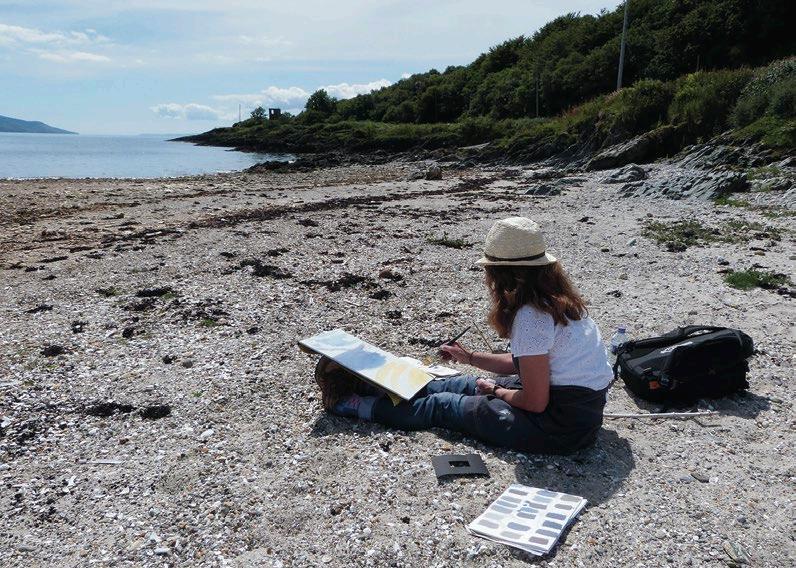
Artists have been drawn to this scenic part of Scotland for centuries

Designed for guests of any level of skill, Guitar Retreats brings music enthusiasts together to learn and play in the distinguished Glewstone Court. With comfortable lounges for informal jamming sessions, private spaces for one-on-one tuition and beautiful gardens for relaxed strumming, you could discover a new passion—or a hidden talent.
Director Stuart Marshall explains, “Guitar Retreats started as a fun weekend for our friends who wanted to play but felt constricted by a lack of time. So we hired a holiday home, piled in with food and drink and we

taught the group to play. It was so fun that we repeated it and more and more people wanted to join!”
“What makes our retreats so special is the camaraderie, the sharing of skills and music, the support for each other and—of course—the craic!”
■ Visit guitar-retreats.co.uk for more details
Have you picked up a new hobby on holiday? Email readersletters@ readersdigest.co.uk and tell us about it!
readersdigest.co.uk/release
Do you want to release the money tied up in your home?
Be sure to read our trusted guide
Your home could be the biggest asset you own. Increasing numbers of UK homeowners over 55 are turning to equity release in order to take advantage of their property wealth without having to move or downsize.
For equity release information you can trust, request your free copy of the Reader’s Digest Equity Release Guide.
readersdigest.co.uk/release





















To request your FREE guide and instant calculations:
0800 029 1233
This is a Lifetime Mortgage. To understand the features and risks, ask for a Personalised Illustration. Reader’s Digest Equity Release is a trading style of Responsible Life Limited. Only if your case completes will Responsible Life Limited charge an advice fee, currently £1,295.





Never-marrieds are choosing to live together rather than marry in their forties—but will the trend become the new normal?
BY SHANA TING LIPTONCULTURE is to be believed, our forties are a restless decade, full of “last hoorah” temptations: red sports cars, fiery flings and regrettable tattoos. Not so for me.
Never really the marrying kind, until now, my life has felt like one long midlife crisis—filled with spontaneous global travels, a parade of bohemian, free-spirited friends and my fair share of boyfriends and romantic drama. It wasn’t until turning 40 that I decided to settle down and live with my partner of nearly three years—a refreshingly kind, straight-laced fellow with a stable job and good values—who I met when I went to evening school to study law.
If anything, I experienced a midlife reversal in my forties—abandoning my single-party-girl lifestyle in favour of much-delayed but contented coupledom, albeit of an unwed variety. Thankfully, though, I can find comfort in the fact that I’m not alone.
According to recent findings from an ongoing survey by the Office of National Statistics (ONS), the married
percentage of the general population in England and Wales has decreased from 54.8 per cent in 2002 to 50.6 per cent in 2015. Those never married but living together has increased by 2.7 percent—a small but palpable shift. This trend “could be associated with people increasingly choosing to cohabit as a precursor to or as an alternative to marriage”, according to Emily Knipe from the ONS’s Demographic Analysis Unit.
“One of the largest changes can be seen in the 40–44 age group,” she adds, explaining that for those of us born between 1971 and 1975, there has clearly been a collective shift in “behaviours surrounding marriage”. And more generally, the population of never-marrieds living together between ages 40 and 49 has increased by a whopping 163 per cent since the start of the survey.
I WAS AGAINST MARRIAGE—I DIDN’T WANT TO BE BORING LIKE MY PARENTS
This trend may be partially due to gun-shyness about marriage on the part of the now middle-aged children of divorced parents, in the opinion of couples counsellor and marital therapist Andrew Marshall, who authored the book It’s Not a Midlife Crisis, It’s An Opportunity.
“This is a time bomb. Parents, the first generation, got divorced in big


numbers…and in some cases spectacularly badly. We don’t want to make the same mistakes as our parents did, so we tend to be incredibly cautious to the point that it’s actually impossible to make a commitment.”
of
marriages can be reluctant to walk down the aisle. Sarah*, a 48-year-old never-married mother has lived with her 60-something partner Dan* for five years, and has happily married parents. Her less traditional path was born of an appreciation for the unorthodox. She rebelled against what she perceived as feminine stereotypes and typical gender roles.
*Names have been changed
Shana (left) doesn’t feel the need to tie the knot, despite having happily married parents
“I was politically against marriage,” Sarah explains, “I didn’t want to be boring like my parents. I thought they were very staid and suburban.”
Like Sarah, my parents had a stable relationship. But in contrast, they met in Swinging Sixties’ London, and moved to Los Angeles, a city infamous for such Hollywood habits as serial divorce and “trading up”. It took my father, an inveterate bachelor, until his late thirties to marry and even then tying the knot was anti-climactic—a spontaneous lunch-break visit to the registry office. I’ve clearly followed in his footsteps.
My parents’ exemplary marriage, amid a sea of 1980s and 1990s divorces, made it more difficult for
me to establish a committed relationship because they’d set the bar so high. I didn’t want to marry the wrong man at some showy public event in front of everyone in my life and then, after having carted away their generous gifts, end up divorcing and eating humble pie.
Marshall explains that celebrity marriages fuel myths around marriage. A-listers Brad Pitt and Angelina Jolie famously claimed that their relationship was fine until they married. Of course, such notions are easily disprovable—both in real life and in the bubble of show business.
Tim Burton was 43 when he began his relationship with Helena Bonham Carter, throughout which the couple lived apart in adjoining houses. Yet the eccentric duo, who shared two children and 13 years together, called
it quits even without the alleged pressure of marriage.
While Sarah’s live-in relationship is happily stable these days (she and Dan recently purchased a home where they reside with her daughter from a previous relationship), it began with its share of drama and baggage. The couple had known each other for over a decade and were working together when they became romantically involved. Dan was married at the time. “It was serious. It was all a bit dicey,” she divulges.
But their partnership’s rocky inception also brought unforeseen benefits. “Because of the nature of our relationship, we’re really open and honest with each other. We talk a lot.” Sarah adds that maturity and previous experience in long-term relationships have helped them learn

Celebrity divorces fuel cultural myths around marriage

more about themselves. Such open communication, along with what Marshall calls “the life skills to negotiate”, are among the benefits of 40-something cohabitation.
Sarah believes that in young relationships, roles and habits develop quickly and can be hard to change later on. However, “when you’re in your forties or older, you’ve got a chance to try it again, but with experience.” Yet her relationship with Dan—who she describes as “not her type” and “establishment”—appears to have all the emotion and intensity of a younger coupling. “We’re just very passionate and think we were meant for each other.”
that romanticised concepts such as soulmates and love at first sight aren’t necessarily age-specific, he argues that older cohabitation relationships “can actually have a little bit more reality about them. There’s less fantasy involved and that’s always good.”
His point about practicality resonates with me, to some degree. A realistic outlook has certainly coloured my relationship—my first ever live-in situation with a romantic partner—as we started out as friends and built on that trust. But I also now see the romance and magic in simple everyday things, something my melodramatic, nonconformist 20-something self would have
scoffed at. And like Sarah’s partner, my better half is also starkly different from me—traditional and old-fashioned, despite being raised the only child of artist parents.
IN YOUR FORTIES OR OLDER, YOU’VE GOT A CHANCE TO TRY AGAIN, BUT WITH EXPERIENCE
I’m an only child too, so respecting each other’s privacy and space has always been a priority. According to Marshall, “If you’re living with a partner for the first time in your forties, it’s more difficult to be flexible, but you do at least know who you are and what makes you happy and you’re prepared to communicate that.”
After we discussed our need for space, my partner Tom laid claim to the living room, turning it into a veritable man cave with his 40-inch TV, surround sound, Xbox, pizza boxes and the odd stray sock. I have co-opted our spare room and styled it as a colourful neo-Georgian office, as I work from home and my career and work space are paramount for me.
Much of my energy in my twenties and thirties went into a laser-like focus on my career goals—which may account for me being a late bloomer in relationships. Marshall
The pressure to have a “perfect” marriage may be putting some couples off tying the knot

confirms that a career-driven, perfectionist view of marriage can factor into some 40-somethings’ decisions to move in together rather than wed—something he says some of them don’t feel “good enough” to embark on.
“A lot of people are under huge pressures to be perfect. They’re often golden children who did very well at school, at university, and got good jobs,” he explains. “Passing exams and getting on at work requires entirely different skills to being successful in a couple.”
Sarah too admits, “I very much identify with what I do,” adding that as a habitual bread-winner, her career had always been her focus.
Her taste in men began changing not long before she embarked on her relationship with Dan.
“I was a single mum and my career was at an intense point. I’d only just been made partner,” she says. “I had a lot on my shoulders. I always used to be attracted to unstable people, but this time I wanted someone who would prove more reliable.”
Certainly, having a child—whether married or cohabiting—changes everything. “One reason that people choose to get married is that it’s the best way of protecting your assets and your children’s welfare. It protects everybody’s interests,” says Marshall of the legal certainty of marriage. Sarah admits that she and
her partner have discussed marriage and that she’s more open to it these days. Her young daughter has also changed her tune and “she’s now into the idea that we get married”.
AS FOR ME, embarking on later-life motherhood is more of a priority than “putting a ring on it”. Tom and I jokingly refer to each other as common-law husband and wife, but that’s the extent to our marriage talk.
Our relationship is free of pressure, and apparently becoming the new
I HAD A LOT ON MY SHOULDERS AND THIS TIME I WANTED SOMEONE RELIABLE
normal. Ultimately, we’re together because we want to be and we enjoy one another’s company—something that’s hugely important in your forties, fifties or any age.
These adorable matching t-shirts prove that the best things come in pairs:







How quickly do you think a house sale can be completed? Three weeks? Two weeks? One week? Try four hours. Yes, you read that right. A house sale—from start to finish—in just four hours
this the fastest house sale ever?
If you have been stuck in a long property chain before, with seemingly endless delays, then you might think a fast house sale is impossible. But, our Reader’s Digest Property partners House Buy Fast have not only achieved it, they also completed the sale in just four hours.
Jonathan Rolande, director of House Buy Fast, said: “Once the price had been agreed and our solicitor had received the paperwork from the seller, we completed the sale in just four hours.
“The seller had found another property and was due to exchange. She was keen for it to happen quickly because she didn’t want to have to find somewhere else to stay and put all her belongings into storage. We pride ourselves on fitting timescales around our clients. It was a challenge—but one that we and our solicitor were up for.
“Luckily the property searches didn’t return anything untoward so we were able to progress in the timescale set for us.”
The seller of the property in Bradford, West Yorkshire, first contacted House Buy Fast in July 2016 but it wasn’t until October 6, 2016, that the final purchase price was agreed upon. Paperwork from the seller agreeing to the sale was sent to the House Buy Fast solicitor and once it
Once the price had been agreed and our solicitor had received the paperwork from the seller, we completed the sale in just four hours

was received on October 7 the sale was completed on the same day.
Mr Rolande continued: “The completion for this property was exceptionally fast. Our average turnaround is about two weeks. The reasons that people want to sell a property quickly vary greatly—from a property chain falling through, to the breakdown of a relationship or mounting financial debts.
“Our solicitor is familiar with everything needed to complete a sale fast and is on standby to help at any time.”
If you would like to find out more about selling your house quickly with Reader’s Digest Property call us on 0800 433 7979 or visit readersdigest.co.uk/property


the chhatrapati Shivaji terminus in Mumbai, India, handles more than three million people each day, making it one of the busiest train stations in the world. Passengers who aren’t in a hurry should take the time to marvel at the building’s eclectic mix of Victorian architecture sprinkled with numerous Indian details.
more than 20,000 azulejos, handpainted ceramic tiles, decorate the entrance hall of the São Bento station in Porto. The renowned painter Jorge Colaço needed no fewer than 11 years to transform the Portuguese terminals into this blue-and-white work of art.
roughly 22 million tourists visit Grand Central Terminal in New York every year more than the number who visit the Louvre! Probably more so than any of its other features, the magnificent Grand Hall is known around the world thanks to its appearance in innumerable films and TV shows. But even the often-overlooked facade of the world’s largest train station has a lot to offer, including the world’s largest Tiffany clock.
a steel and glass roof suspended delicately over the platforms is the centrepiece of Liège-Guillemins in Liège. This futuristic train station, with its open-on-all-sides design, is an example of environmentally sustainable architecture, as it needs no artificial lighting during the day.
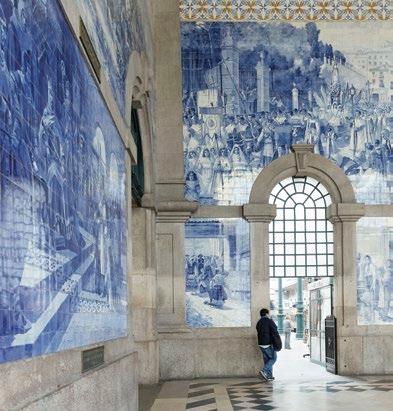



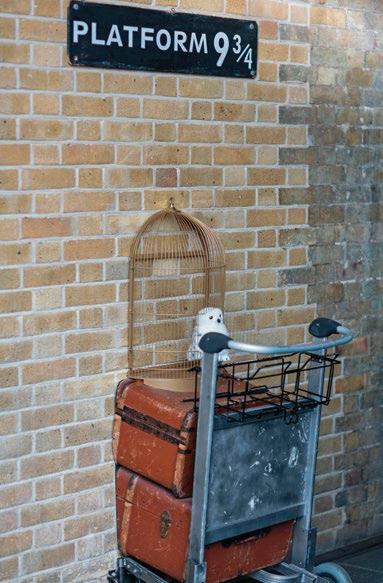
Platform 9¾ is where you need to go to catch the train to Hogwarts, the famous school from the Harry Potter novels. Fans large and small flock to London’s King’s Cross station to search for the platform. Warning, though only truly magical students make it through the brick wall!
a holiday under the palms is what passengers at Madrid’s Atocha station experience, as the Spanish capital’s largest train station features this massive indoor palm garden.







It’s been said that in order to know where we truly belong, we must first take adventures—and there is a great big world out there just waiting to be discovered! This is why Reader’s Digest is working with Collette travel to bring you tours across the globe that will re-ignite your passion for adventure and immerse you in the environment and culture that each unique tour experience o ers.
Great travel is largely about the company you keep, and our tours will put you in the hands of knowledgeable mavens who know a specific part of the world expertly. They will be your guides, concierge and companions, guiding you through the best your chosen destination has to give.
From cultural city breaks to adventures o the beaten track, there is a tour to suit every traveller and no two tours are the same. Each one provides you with luxury travel experiences without extortionate price tags, plus all of the organising is in our hands, including handpicked hotels, tour excursions, a dedicated tour manager and most meals included—perfect if you’re looking for a thrill-filled holiday with none of the hassle.
To learn more about all of our unique, sought-after experiences and to build your own adventure, visit readersdigest.co.uk/adventures WITH













An eight-day tour uncovering the roots of north America’s rich musical history. Taking in Nashville, Memphis and New Orleans, this tour will give music lovers an authentic taste of the cities that created our modern musical landscape.
Experience a world of nature and the astonishing beauty and diversity of Costa Rica with our 12-day tour. Starting in the capital, San Jose then taking in the wonders of Tortuguero National Park, Arenal Volcano and Manuel Antonio National Park.
A country of astonishing natural beauty, a spellbinding ancient past and a recent history of dignity, reconciliation and hope. This 12-day tour starts in Johannesburg, and takes you on a safari adventure before enjoying all that Cape Town has to o er.
To find out more information on these three inspirational tours and discover all of our tailored tour experiences visit readersdigest.co.uk/adventures
BY CATHY ADAMS
Cathy has danced in Rio, been microlighting in South Africa and hiked the mountains of Oman
Tell us about your favourite holiday (send a photo too) and if we include it on this page we’ll pay you £50. Go to readersdigest. co.uk/ contact-us
Son is home to just 500 Norwegians— and lots of boats
Rosa Liagridonis from Eastbourne falls in love with the village of Son
A WEEKEND TRIP TO SON, A FISHING VILLAGE IN NORWAY, that I’d planned with a friend had to be completely overhauled when she cancelled at the last minute—so I decided to take my eight-year-old daughter along instead.


Son, 30 miles south of Oslo, proved to be an idyllic spot for a family weekend away. The Son Spa hotel, where we stayed, was a leisurely ten-minute walk from the village. Every day we took the rocky route there, climbing over boulders on the shoreline, which amused my daughter (and gave me a bit of a workout, too).
A characteristic feature of Son, which settles along the sunny side of the Oslo Fjord, are its small white wooden houses. Lined along twisting streets and narrow alleys, they encompass the tiny village and offer a sense of simple tranquillity. We came across a Second World War memorial and reflected how similarly nostalgic scenes on the South Downs, near where we live, connected us to a shared history.
During our weekend trip, the harbour was saturated with boats and the village square buzzed with a weekend market, including a stall that sold delicious home-made ice cream. Surprisingly, for such a tiny village with a population of fewer
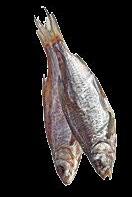

than 500, Son has a great selection of restaurants, ranging from Italian and American to traditional Norwegian cuisine. On one night, a kind chef even whipped up some traditional Norwegian sausages and not-sotraditional chips for my daughter just as the restaurant was closing.
We found the locals pleasant, always ready for a conversation and inquisitive about what brought us to their obscure little fishing village. Their welcoming spirit makes me want to go back!
Ryanair flies to Oslo from £17pp one-way (ryanair.co.uk). Rooms at The Son Spa Hotel start from £125 a night (nordicchoicehotels.com).

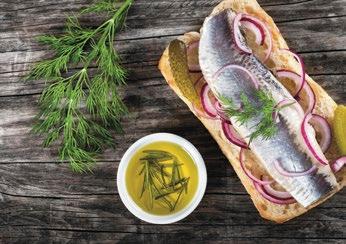

WITHIN
25,000 square mile perimeter, there are gorgeous beaches (Bentota), historic monuments (the Galle Fort) and national parks (Yala), in which leopards and elephants roam. The south Asian country, known as Ceylon during British colonial rule, is also the world’s fourth-largest producer of tea.
Corinthian Travel offers a Classic Sri Lanka tour from £2,445pp (corinthiantravel.co.uk).

■ STAY: BAUDON DE MAUNY Right in the heart of Montpellier’s historic quarter is this 18th-century townhouse styled as a sleek boutique hotel. Rooms are spacious and bright, with white linens and modern furnishings. Rooms average around £193 a night (+33 0467 022 177, baudondemauny.com).
■ SEE: PLACE DE LA COMÉDIE Daily life takes place in vast Place de la Comédie, named after a theatre. Pull up at one of the many outdoor cafes that line the square and order a café crème before settling in for an afternoon of people-watching (montpellier-france.com).
■ SUNBATHE: LA GRANDE MOTTE Montpellier’s nearest beach is the art deco-inspired resort La Grand Motte. The slightly dated architecture doesn’t detract from the main event: sprawling golden sands and the topaz-flecked waters of the Mediterranean (lagrandemotte.com).
TRAVEL
APP OF THE
MONTH

PackPoint, £1.99, Android, iOS. This neatly organises your packing list according to location, weather and length of trip—so you’re never without sunnies or an umbrella at the crucial moment.
SHORT/LONG HAUL: WALKING HOLIDAYS
SHORT: Welsh Coast Hike the entire Wales Coast Path in 80 days with a new tour from Celtic Trails—with the promise of a champagne picnic at the end (01291 689774; celtictrailswalking holidays.co.uk).

LONG: Canadian Rockies Billed as a “gentle” walk, this 13-day walking trip weaves through some of the most dramatic scenery in Canada, including the Yoho National Park (01453 844400, mountainkingdoms.com).
FOR MORE, GO TO
Escape to one of nine stunning locations across the UK, each set exclusively in Forestry Commission owned land. Stay in luxurious moder n cabins - many with outdoor hot tubs - and set deep in woodlands, on the edge of mighty lochs, or in bright forest meadows and make your holiday your own.

Save 15%
On cabin breaks during August with code READERSUMMER
*Breaks must be taken by 31st August subject to availability 15% is off the price of the cabin only and not available in conjunction with any other offer




Whether you are escaping to the forest for romance, to recharge your batteries and relax, or to spend time with friends and family, Forest Holidays is your perfect choice. Dogs are welcome, too, in selected cabins. Equipped with everything you need for a self-catering break, your cabin is your personal sanctuary in the forest.
Your options are limitless: enjoy an in-cabin spa treatment, a BBQ on your deck, or stargaze from your private hot tub ... If your energy is high, try cycling, canoeing, Forest Ranger adventures, and much more. Whatever you choose, our woodland surroundings will work their quiet magic on you, making this the most memorable of holidays.
That’s why 97.6% of our guests say they will retur n on a Forest Holiday…
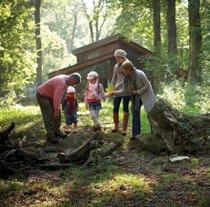






The real treasures on Chile’s remote Robinson Crusoe Island are the peace and quiet
THE TINY AIRCRAFT HAS BARELY COME TO A FULL stop on Robinson Crusoe Island’s airstrip when a mustachioed man tells me to start walking. “We can take your bag, but we can’t fit you,” he says as he jumps into a jeep that crawls away under the weight of my luggage (with supplies from mainland Chile) and three soldiers perched on the roof, their legs dangling over the windscreen. I set out on foot down a gravel road that cuts through a wind-slashed rockscape dotted with poppies.
AFTER 15 MINUTES I hear singing. It’s a tenor belting out an aria, but it’s impossible to make out the words, mangled as they are by the breeze from the Pacific Ocean. When the road dips down to the sheltered bay where a boat is waiting, ready to transfer us to the island’s only town, I see a whole choir carefully practising their do-re-mis.
I hadn’t expected such a dramatic welcome in the middle of nowhere. Located 415 miles from the port city of Valparaíso, Robinson Crusoe is a far-flung buoy tethered to a wire of hardened magma that stretches for miles from the ocean floor. Mr Mustachio ferries us in an open vessel across the heaving swell toward the village of San Juan Bautista. I feel like an astronaut
clinging to a Canadarm in space— except here, the deep-blue backdrop gives way to walls of volcanic rock that appear to have been folded by a giant accordion maker. No wonder pirates and buccaneers once used this island as a safe haven.
I’M SAVOURING THE IDEA OF LIVING LIKE ALEXANDER SELKIRK—THE SCOTTISH SAILOR WHO INSPIRED ROBINSON CRUSOE
“You need a break from the big city?” the skipper asks as he steers us into Bahía Cumberland, setting lobster-trap floaters and moored fishing boats in motion.
“You’ve come to the right place: only about 900 of us live here,” he says and nods toward the wooden houses on the shore. As I grab my bag to get off the boat, he reveals that phone and internet service are spotty at best (a 2010 tsunami tore out the island’s landline). “Good luck keeping in touch with the continent!”
He doesn’t realise that I’m already savouring the idea of living for a few days like a modern-day Alexander Selkirk, the Scottish sailor who was marooned here in 1704 and inspired Daniel Defoe to write Robinson Crusoe , published in 1719.
“BRING A RAIN JACKET, just in case— the weather here is hormonal,” warns Nicole Marré, watching pregnant clouds shuffle across the bay from the living room at Más a Tierra EcoLodge. Over a breakfast of bread, mashed avocado and cheese, she and her husband, Guillermo Martínez, who co-owns the four-room guest house, have given me the lowdown on the island’s hiking trails, the best—and, let’s face it, pretty much the only—way to see the mist-soaked peaks, festooned with plants found nowhere else on the planet.
“The Juan Fernández Islands are home to about 130 endemic species—more than you’d find on the Galápagos,” says Martínez, as he hands me a trail map that outlines the entire archipelago, named after the Spaniard who first land-ahoyed here in 1574. Inspired by the promise of naturalist booty, I head off to the Selkirk lookout, where the banished sailor is believed to have waited for ships to rescue him from his fouryear solitude.
At the upper edge of town, a steep path winds through a fragrant eucalyptus forest to the island’s

An endemic firecrown hummingbird homes in on a hibiscus flower
national park boundary. I pause at a blooming cabbage tree buzzing with Juan Fernández firecrowns—red and green hummingbirds that only flutter their wings here. I also come across a few gnarly canelo and luma trees, the latter being the firecrown’s favourite nesting spot. The higher the altitude, the more humid the air and the denser the vegetation. An hour and a half into my hike, I find myself in a Henri Rousseau painting. Cushy moss carpets the ground and tree ferns tower over me, as do gigantic gunnera, rhubarb-like plants that block the sun with their umbrella-shaped leaves. When I eventually reach the lookout, I catch up with a Spanish couple and a woman from the continent.
I unpack an oatmeal cookie left
over from breakfast, and the solo trekker takes out a thermos of coffee. Sharing a mini-picnic above chameleon slopes studded with chonta palms, we agree that if we’d been marooned here all those years ago, we’d never have left.
Back at sea level, the six-table patio at Más a Tierra is packed, but Martínez brings out a small table from indoors. “I want what they’re having,” I say, pointing at the spiny rock lobsters that have landed on my neighbours’ plates. When he serves my order on a platter, he’s excited to tell me that he’s just come back from the vet, who’s come to town thanks to the navy, which only anchors here twice a year.
A PISCO SOUR MATERIALISES AS IF BY MAGIC, AND I’M
WHISKED TO A SWING ON A VERANDA
I REALISE THIS ISLAND is the definition of remote when Pía Pablo pulls up in a golf cart at Más a Tierra. After throwing my bag in the back, I sit down beside her. We’re off to Bahía Pangal, a secluded bay that lets you get away from it all, including the town’s rush hour, when two people might enter the main intersection by the wharf at exactly the same time. Pablo, the manager at Crusoe Island Lodge, spots three fishermen standing by the roadside. “What do you have?” she shouts.
“If we hadn’t gotten an appointment today, we would have had to send our dog to the mainland with the twice-a-month supply ship,” he explains. (Luckily for the island’s humans, there’s a permanent clinic staffed by a doctor and a nurse.)
I rip into my lunch, scraping out every morsel from the skinny legs before I get to work on the tail. Tasting the sweet, tender meat, I understand why the foot-long crustacean is the archipelago’s prized resource.
The fishermen reach into a wheelbarrow and hold up their catch; Pablo hands them a wad of cash.
“For the ceviche!” she says and passes me a bag filled with shiny yellowtail amberjacks before she continues driving. When we arrive at the lodge, a pisco sour materialises as if by magic and I’m whisked to a swing on a veranda overlooking the ocean. There’s no one else around, and when it dawns on me that I’m the hotel’s sole guest for the next two days, I feel like the queen of the castle.
I’m soon on my way by boat to Puerto Inglés, where I’m greeted by a group of men, their bare shoulders sprinkled with ochre dust. They’re jamming shovels
into the ground under the supervision of Bernard Keiser, an American who’s funding the excavation of what he believes is long-lost treasure. Keiser walks me over to a cave and points at some proto-graffiti carved into the rock, which he believes was a code etched by Captain General Don Juan Esteban de Ubilla y Echeverria, who absconded in the early 1700s along with barrels of gold and jewellery, now thought to be worth billions.
“I’m convinced he left these marks to indicate where to find the loot,” says Keiser. We walk back to the dig. I scan the site and look down into

 The four-room Más a Tierra lodge; (above) Más a Tierra co-owner Guillermo Martínez and his wife, Nicole Marré
The four-room Más a Tierra lodge; (above) Más a Tierra co-owner Guillermo Martínez and his wife, Nicole Marré
GETTING AROUND The fastest way to reach the Selkirk lookout or the summit of Cerro Centinela is on horseback. Saddle up with Guido Balbontín from Cabalgatas Tierra Mágica, who can also take you through the enchanted forest at Plazoleta El Yunque (56-9-8998-8204).
DINING After hiking the island’s many trails, sit down on brewer Claudio Matamala’s deck for a cold one from his Cerveza Archipiélago (cervezaarchipielago. cl). Nicole Marré and Guillermo Martínez at Más a Tierra Eco-Lodge swap out the clichéd Chilean folkloric music, fried foods and white rice for octopus carpaccio, amberjack ceviche and golden-crab stew, served to a soundtrack of reggae, bossa nova or Spanish pop (masatierraecolodge.com).
HOTELS If you yearn to get away from it all while you’re away from it all, Crusoe Island Lodge has everything you need to live like a pampered marooned sailor—hot tub and sauna, pisco sours, scuba gear, freshly cooked lobster and golden crab, a library with a fireplace—on a sheltered bay outside of town (crusoeisland lodge.com).
the hole, which vaguely resembles an open-pit mine, and kick a few rocks around in the hope of finding something. It isn’t until I swing by the town later that afternoon that I strike gold.
MY SKIPPER DROPS ME OFF at the wharf and I scoot up to a small house with a wooden deck that cantilevers over the hillside. I knock, and Claudio Matamala, the owner of Cerveza Archipiélago, opens the door of his nanobrewery, which produces a total of 3,000 to 4,000 bottles of golden lager, amber ale and coffee-coloured stout per month.
“I like beer, but with so few provisions brought here, I had to start making it myself. When my friends tasted the first batch, a lager, they wanted me to make some for them, too,” he says as he shows me around the pint-sized facility. “Now I sell to restaurants and bars on the continent.” He pours me his awardwinning wheat ale and we step out on the deck to clink glasses.
Eager to fully immerse myself in the local wonders, I head back across the waves to Crusoe Island Lodge, where I meet up with the hotel’s Víctor Aguirre. Once he’s kitted me out with a wetsuit, fins and a snorkel, we waddle down to the rocky shore and jump in the water. I’m surprised at how warm it is—I’d expected about 10C, but it’s a balmy 17. Following Aguirre, I peer through
the crystalline water. There’s a kaleidoscope of boulders and kelp sheltering Chilean sea urchins and schools of butterfish that whip out in flashes of blue and yellow. A reddish rock moves below; it’s an octopus tugging at seaweed, as if pulling up a duvet.
When we reach the shore, Aguirre sheds his fins and runs off, “You’re in luck: the hot tub is ready!” A rustic
fire–heated wooden soaker has been warming up while we’ve been snorkelling. I ease into the steaming water, and before I know it, Aguirre comes over with an island lager. I take a big gulp, then scan the ocean for whales, seals, ships. The navy has sailed off, and there’s nothing to blur the horizon. I’ve discovered the real treasure of Robinson Crusoe: solitude.
These impish felines are officially busted…


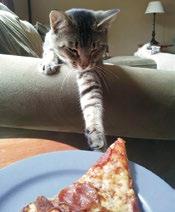
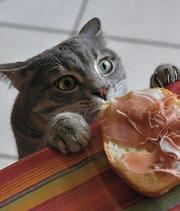


Do you ever feel there’s just too much going on? Cleaning up your finances is just one way to make your life easier
BY ANDY WEBB
Andy Webb is a personal finance journalist and runs the awardwinning money blog Be Clever With Your Cash
A LEANER BUDGET doesn’t mean you have to lead a frugal life. Instead try to focus your finances and your energy where it counts and, hopefully, you’ll be able to lead the life you want. To help you achieve this, here are five ways you can downsize your finances.
1. Review your priorities
What do you want to do with your days? Whether it’s travelling more or simply having an easier life, make that the focus of your spending.
It’s helpful to draw up a budget of all your outgoings so you can see where the money goes once the essentials are covered—and you might be surprised how much disappears on things you don’t really care about.
2. Stop paying for services you don’t use
Having a choice often feels like a good thing, but when there are too many options the end result is frequently that we don’t make the best use of what we pay for. TV is a perfect example—hundreds of channels, but how many do you actually watch? If you’re paying for any kind of service or subscription you don’t really use, cancel your contract and stop paying for it.
There will, of course, be bills and services you can’t cut. But you can make sure you’re spending as little as possible.

Spend an afternoon comparing new deals on your energy and telecoms bills. If you can save, switch over and make a note to do it again when your new contract ends.
3. Minimise your spending
This doesn’t mean stop buying things. It’s really just about buying less. It’s a good challenge to help you keep your life simple.
Before you pick something up in a shop, think about whether you really do want or even need it. If the answer isn’t a clear yes, walk away— you can always go back in a few days if you change your mind.
4. Clear your cards
Credit cards can be useful, but if you’re using them to stretch your spending power, they’re likely costing
you more than they need to. Pay them off as quickly as you can, then cancel them and cut them up.
Keep one card for emergencies, but don’t carry it around with you. That way you can’t get tempted to spend on it when you’re out and about.
5. Declutter your cupboards
This won’t just help remove distractions from your home, it’ll also improve your bank balance.
Go through your storage spaces such as your shed, garage or loft. First, look for things that you might be able to use or repair. This will prevent you buying things you’ve forgotten you already had.
Then find the things you don’t use, and know you aren’t likely to use again. See if you can sell any of these at a car boot sale or online.

SHOPPING, I think about how much easier it’s made the process of buying things. I can shop at any time of the day, not just when shops are open: I can buy from stores even if there isn’t one local to me; and of course prices can be far lower.
But as with most digital advances, there are downsides, including the greater risk of fraud. Scammers are getting more and more advanced, easily able to create websites that look authentic. Then there are the hackers who try to steal your personal data, and sometimes even card details.
This is something my mum is understandably concerned with. But she has a couple of very simple tricks that minimise the chances of her credit card details being stolen.
First, whenever she buys online, she uses the same card. Whether that’s online supermarket shopping or gifts for my niece and nephew, it’s always the same card. If she was to accidentally use a dodgy site, she’d only need to cancel the one card.
Plus it makes it a lot easier to keep track of online spending. Each month she’ll check the statement and if anything crops up she’s not sure about, it’s easier to identify what it could be.
Secondly, she never stores her card details in her online shop accounts. Yes this adds a few minutes every time she goes to check out—but it means if she were to have an online shopping account compromised, they wouldn’t have access to her payment details.

Have a card specifically and solely for online shopping. MY MUM’S MONEY TIP:
MONEY WEBSITE OF THE MONTH:
Onedox
onedox.com
ONE OF THE FACTORS that stops people switching utilities is pretty obvious: we forget.

It’s an understandable barrier to getting the best deal. Many contracts are for 12 months—if not 18 or 24— and, realistically thinking, nobody will remember a year or so on later that they need to renew or change it.
Website OneDox can make it all a lot easier, and it doesn’t rely on your memory or putting the date in your diary.
Instead you give the site access to your different utility and telecoms bills. Then you’ll get an email reminder when your energy, phone, broadband or mobile service is due for renewal. You can add your MOT and car tax too.
You can also view all your bills together in one place—and with just one username and password to remember, it’s far easier to keep on top of your household finance admin.

HALF OF BRITS will attend up to three weddings a year, totalling close to £800 over a “wedding season”.
Here are some of the top expenses:
Present: £79
New dress/suit: £80
Shoes: £40
Hotels: £50
Drinks: £34

Rachel Walker is a food writer for numerous national publications. Visit rachel-walker.co.uk for more details
DISHES COOKED IN BUTTER, CREAM AND CIDER are often attributed to Normandy: sole à la normande, galettes à la normande and Normandy chicken. It seems unfair when Britain’s own cider industry is booming.
Perhaps geographic relabelling should be considered— dependent on the cider. Aspall’s cider, for example, would make this a Suffolk pork casserole, while Thatchers’ would make it a Somerset pork casserole.
Provenance aside, this is a great mid-season dish. The crème fraîche and squeeze of lemon give it a lightness that differentiates it from a more wintery stew. It can be put together mid-afternoon and then whipped out of the oven just before dinner—the appley-pork aromas celebrating the transition from late summer to autumn.
Serves 4
• 50g butter
• 1kg diced pork shoulder
• 200g smoked lardons
• 12 small shallots, peeled and halved
• 2 celery sticks, cut into 2cm slices
• 500ml cider (eg, Stowford Press for Herefordshire)
• 500ml chicken stock
• 2 bay leaves
• 2tbsp cornflour mixed with 2tbsp cold water
• 2tbsp mustard, preferably wholegrain
• 4tbsp crème fraîche
• ½ lemon
• 1tbsp thyme

1. Preheat the oven to 170C.
HILL2. Brown the pork shoulder in two batches: heat half the butter in a casserole dish, add the pork and fry until it takes on a goldenbrown colour. Remove it from the pan with a slotted spoon, and then repeat with the remaining butter and pork.
3. Tip the smoked lardons, halved shallots and celery slices into the same casserole dish. Cook until the lardons start to crisp, and the vegetables begin to soften and colour.

4. Return the pork to the pan, and then pour over the cider and chicken stock. Bring it to a simmer and add the bay leaves, then cover and cook in the oven for 1.5–2 hours, until the pork is tender.
Serve with mashed potato or celeriac and mustard mash. Top off with some lightly steamed greens, and put the mustard on the table so people can add more if they wish.
5. Add the cornflour mixture to the casserole, and stir on the heat while the sauce thickens. Add the mustard, crème fraîche, squeeze of lemon and thyme. Taste and add more of any of the above if necessary, and then season with salt and pepper.
“For something to be labelled a ‘cider’, it only needs to contain 35 per cent apple juice,” explains Felix Nash, founder of The Fine Cider Company. “That can come from concentrate, or juice from non-cider apples.”

Listening to him at the “Fine Cider Lunch” at an East London restaurant, I discover that some of the best small-batch ciders are produced in Britain. What’s most striking is how little they taste like anything you might pick up in a supermarket.
The good news is that restaurants are starting to get on-board, and artisanal ciders are popping up on drinks list—often served chilled, in 750ml sharing bottles for the table.
Look out for Butford Aurora Fine Perry, an exceedingly elegant pear cider, best drunk in small measures from a flute rather than a pint glass (as was customary in the Stuart Period). Find & Foster Methode Traditionelle is a great entry into the world of artisanal cider—a real crowd-pleaser of a tipple—while Once Upon A Tree, Carpenters Croft Fine Cider is a more “marmite” option, best served with food. Those who are seduced by farmyard flavours and a hint of bitterness will have found their perfect match.
■ Butford Aurora Fine Perry, 2014 (5%), £8/750ml butfordorganics.co.uk
■ Find & Foster Methode Traditionelle, 2015 (7.5%), £17.50/750ml findandfosterfineciders.com
■ Once Upon A Tree, Carpenters Croft Fine Cider, 2011 (7.5%), £12.25/750ml onceuponatree.co.uk




Pudding doesn’t come much simpler than this, though its ease isn’t reflected in its heavenly flavour. This, to me, is autumn.
All it needs is a drizzle of cream to serve (though my grandfather would heartily disagree, and insist that cream, ice cream and custard are all mandatory).
• 150ml cider
• 100g dried fruit (sultanas, sliced apricots, prunes, figs)
• 50g butter
• 50g brown sugar
• 1 lemon, zested
• 4 eating apples
(Russet, Cox’s)
1. Gently heat the cider, and then pour it over the dried fruit. Leave to let the fruit soak up the liquid.
2. Preheat the oven to 180C.
3. Heat the butter and brown sugar in a pan, stirring until it’s a smooth sauce without any sugar granules. Add the dried fruit and lemon zest.
4. Core the apples, sit them in a baking tray and then fill with the fruit-caramel sauce. Bake for 15–20 minutes, and serve with a drizzle of cream.
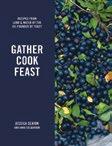
Gather, Cook, Feast by Jessica Seaton and Anna Colquhoun, £26, Fig Tree. Over 120 seasonal and creative recipes.

Enamel pie dish, ukhomeware.co.uk.
Keep it simple with this modern classic.

Fluted deep pie mould, £29.50, Nom Living, . This will take apple pies to the next level.

Lynda Clark is a homes, property and interiors expert, and editor of First Time Buyer magazine
THE WAREHOUSE LOOK WILL MAKE a big splash this season. A contemporary tribute to industrial aesthetics, it works well for both contemporary and classic interiors. Cooler, dramatic hues such as steel grey will complement a modern scheme, while classic-inspired styles tend to work best with warm and natural colours, including pearl grey. You can also add a pop of colour with a bright orange chair or a cornflower blue coffee table. To complete the look, add natural materials (such as soft woven throws), some faux fur and one or two fashionable metallic accessories.
Hendrix angular floor lamp, £80; Zanzio three-seater sofa, £499; mineral texture cushion, £25; gold spot cushion, £15; Kaikoo faux fur throw, £39; Teddy side table, £29; knitted pouffe, £79; diamond rug, from £69.
■ All available from Very (very.co.uk)
Keep your house trendy with these striking and stylish grey accessories.
■ Unicorn Breath dead flat matt emulsion paint, £34.99 for 2L, dowsingandreynolds.com
■ Matrix Guild rug, £99, therugseller.co.uk
■ Mhy Muuto pendant light, £155, rume.com
■ Tivoli two-seater sofa, £589, swooneditions.com






To celebrate the great actress Virginia McKenna’s 80th birthday, Harkness Roses has launched the stunning Virginia McKenna rose. This versatile flower features a strong citronella scent, which emerges as the flower opens (rather than in a young bloom). It has beautiful cream and white petals and is perfect for use in beds, borders or low hedges. Available as a bare root for £13.95 from November to February or potted from March to October at £16.45 (roses.co.uk).
Place a contemporary table next to a bed or sofa for a stylish update SIDE BY SIDE

Morocco is the inspiration for these artisan hammer tables, £69 (jdwilliams.co.uk).

This versatile Jakarta nest of two tables will come in very useful, £79 (very.co.uk).

A delightfully chunky wooden table at a reasonable price, £39 (jdwilliams.co.uk).
From listening to music to drinking tap water, these gadgets will subtly improve your day

Olly is a technology expert, radio presenter and podcaster

I.AM BUTTONS, £170 With his penchant for auto-tune, Day-Glo shades and relentless self-promotion, will.i.am strikes me as a bit of a berk. That he’s branded these wireless in-earphones “Bluetooth Earphones For The Dope” doesn’t help matters. And yet: the magnetic disks, concealed within each earphone, are a design masterstroke. They satisfyingly clip and unclip round your neck, and won’t fall off, even if you wear them all day. The circular metallic finish is stylish, sound quality is decent (especially on calls), and syncing is blissfully straightforward. Well done, Will.

APPLE APP OF THE MONTH: CHEATSHEET, FREE
This is a great little app for assembling all those random sequences of numbers and letters that frustrate us on a daily basis, and assigning each

a visual icon. For example, my library membership number is now filed under a picture of a book, and I’ve bookmarked the security code for the wi-fi in my local café with an icon of a coffee cup. Surprisingly useful.
Fill this plastic jug with tap water, then leave it in your fridge for a fresh supply of cold, filtered water. So far, so Brita...Zerowater’s USP, however, is a five-stage “ion-exchange technology”. They’re so convinced their filter removes total dissolved solids (TDS), they even chuck in a free TDS reader—a little electronic device you dip into water samples for a purity test. My local tap water returned a scarysounding “TDS score” of 353. Once filtered through the Zerowater, it produced a reading of 000. That may sound pseudo-sciencey, but it’s an impressive trick, and the water tastes good—ie, of nothing at all.

Cloud storage is convenient—yet many prefer to still store their files on hard drives, for the sake of privacy. There is a security issue with those, though: if anyone physically picks up your hard drive and runs off with it, they can clone it within minutes. Not so with this portable hard drive: it has a keypad on the front, rather like a hotelroom safe, so only those who know the seven to 15 digit PIN you’ve chosen are able to unlock your files. There’s also a nifty integrated USB cable, and four different colour finishes to choose from. Clever British design.


DELIVERED, FREE Finally available on Android, you can now manage NHS repeat prescriptions using this slick, intuitive app. You simply search for your local GP (90 per cent in England are currently registered), and with a few taps can reorder your regular prescriptions, which are then sent to you via Royal Mail. Even more handily, the app can also remind you when to take your medication.


Georgina is a fashion and beauty editor for numerous travel titles and a blogger at withgeorgia.com
ANCIENT EGYPTIAN CULTURE HAS IMPACTED
MODERN LIFE in countless ways, including our current beauty trends. Rouge cheeks, red lipstick and black eyeliner were all customs of the extraordinary civilisation. Heavily kohl-lined eyes served many purposes—aside from being an indicator of wealth and a fashion that was worn by all, it offered protection against the elements.
It was first made from the natural mineral galena, mixed with myriad ingredients—rubies if you were wealthy or soot if you were poor—and stored in elaborately decorated pots complete with an applicator.
Luckily the ingredients for kohl have advanced from soot and stone, but the concept of a kohl pot remains: Barry M’s Waterproof Gel Liner (£5.49, boots.com) is just one example of how we continue to take a cue from Ancient Egypt—and if the method works, then why fix it?
■ Urban Decay’s Naked Skin Colour Correcting Fluid in pink (£19, urbandecay.co.uk) is a miracle worker; swipe it just below your eyes, blend it in and watch your dark circles disappear. The pink tone is specially formulated to brighten those telltale purple patches.


■ If you’re prone to the occasional unsightly pimple, try the Effaclar Duo Anti-Imperfections Corrector (£16, laroche-posay.co.uk) from La Roche-Posay. The gel moisturiser is made for oily skin—it reduces shine, redness and gets to work on unclogging pores.


■ This linen tee with lime-green dots really does hit the spot (£79, east.co.uk).

■ Who needs expensive cufflinks? A spotty tie can lift otherwise dull suits (£12, burton.co.uk).
■ Jazz up your trouser collection with this spotty pair from East (£85, east.co.uk).

■ You can also make workwear more fun with a dotty white shirt (£35, houseoffraser.co.uk).


■ Be the perfect 1950s pin-up in this polka-dot dress (£45, wallis.co.uk).

■ Flash your spots every now and again with these polka-dot socks—a subtle nod to the trend (£9, happysocks.com).
Women’s fiction that will appeal to both sexes and a characteristically gothic tome are this month’s top reads

James writes and presents the BBC Radio
4 literary quiz
The Write Stuff
Kate Reddy was last seen in Allison Pearson’s huge 2003 best-seller I Don’t Know How She Does It juggling two small children and a high-flying job. Now, she’s hurtling towards 50 and not best pleased about it. These days, when a hunky man catches her eye on public transport it’s to offer her a seat. Not only that, but her teenage daughter’s bottom has gone viral and her husband’s new-found belief that mindfulness and Lycra-clad cycling are preferable to earning money means that Kate has to return to work. But will anybody employ a 49-year-old woman?

Once again, Pearson examines the difficulties faced by her generation of women with encyclopaedic thoroughness, great humanity and an impressive refusal to sugar-coat any indignities involved—in this case, often menopause-related. Above all, though, this is a very funny book, with genuine laughs on almost every page.
Male readers—not the target audience, I appreciate—will also be hard-pressed not to enjoy this wildly entertaining and wholly recognisable portrait of modern middle-class life.
NAME THE AUTHOR
(Answer on p128)
Can you guess the writer from these clues (and, of course, the fewer you need the better)?
1. His name appears in a Beatles’ song.
2. Arthur Conan Doyle credited him with inventing the detective story.
3. He wrote The Murders in the Rue Morgue.

Given that he grew up near Broadmoor, it’s perhaps not surprising that many of Patrick McGrath’s novels feature violent insanity. So, eventually, does his new one—but not before he’s given us plenty of other things to chew on.
The book is set in 1947 with post-war Britain feeling “morally magnificent and economically broke”. This moral magnificence, however, isn’t shared by everybody. As The Wardrobe Mistress startlingly reminds us, when British fascists who’d been imprisoned during the war were released, many of them simply resumed their anti-Semitic activities.
For the main character Joan Grice—herself Jewish—this is alarming enough, especially at a time when she’s overwhelmed with grief after the death of her actor husband Charlie. But then she discovers that Charlie had been a fascist too… McGrath traces Joan’s disorientation and horror with all his customary power—while also serving up a sharply detailed picture of the theatre world, a large cast of memorable characters and a series of overlapping love stories. The result is a rich and highly spiced feast of a novel, even before it reaches its classically gothic McGrath climax.
n A Family Secret by Josephine Cox (HarperCollins, £7.99) Cox’s many fans won’t be disappointed by her 53rd (!) novel, another generous slice of warm-hearted storytelling that spans generations.
n Horses, Heifers and Hairy Pigs by Julian Norton (Michael O’Mara, £8.99) Like James Herriot, Yorkshire vet Norton successfully mixes comic anecdotes with a wistful lament for a vanishing way of rural life.
n The Boy Who Gave His Heart Away by Cole Moreton (Harper Element, £8.99) Extremely moving true story of one teenage boy who died, and another whose life he saved by donating his heart—and of how their mothers became friends.
n The Transition by Luke Kennard (Fourth Estate, £8.99) Clever, entertaining satire, set in a near-future Britain where all our current trends have come home to roost.
n Born to Run by Bruce Springsteen (Simon & Schuster, £9.99) Highclass rock memoir, in which Springsteen proves surprisingly candid about his life.

RD’S RECOMMENDED READ
A new non-fiction book from a highly successful novelist will make you reflect on your own life story
WHEN MAGGIE O’FARRELL WAS 18, she went walking in the countryside. A man approached her in a way that immediately felt threatening and at one point put the strap of his binoculars around her neck. Although nothing worse happened, O’Farrell felt scared enough to report him to the police, who dismissed her fears as silly. Two weeks later, the same man strangled another young woman to death with his binoculars strap.

This incident forms the first chapter of O’Farrell’s extraordinary new book—and proves a perfect introduction to what follows. For one thing, it’s so vividly written that you find yourself holding your breath while reading. (Not for nothing is
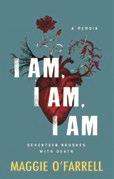
I Am, I Am, I Am; Seventeen Brushes with Death by Maggie O’Farrell is published by The Tinder Press at £18.99.
O’Farrell a highly successful novelist.) For another, it establishes her main theme here: the fragility, even randomness, of all of our lives.
Seventeen brushes with death might seem a lot for one person and, in truth, some are closer than others. Even so, O’Farrell has had plenty of bona fide near-death moments— including drowning, car accidents and childbirth—and there’s one big reason why. When she was eight, she contracted encephalitis, a brain disease that at first looked as if it would kill her, then that it would leave her unable to walk.
In fact, after a year in a wheelchair, she did recover, but was left with
impaired motor skills that have been a danger to her ever since.
She also explains that, “coming so close to death as a child, only to resurface into life, imbued in me for a long time a crazed attitude to risk.”
In the longest chapter, she writes about that encephalitis, from the first blinding headache to the slow process of learning to walk again— at the physiotherapy department of a Welsh hospital…
One day, a young man with a close-cut dark beard wheeled himself over to me.
‘Want one?’ he said, dangling a gold-wrapped toffee above me. He had an undulating, smooth-vowelled Valleys accent.
I said yes. He knew to unwrap it for me and he did it with an air of unconcern, seemingly not noticing the compulsive shake of my hands.
He unwrapped another for himself. We sucked and chewed companionably for a moment, me on the floor, him in his wheelchair.
‘Were you always like this, then?’ he said abruptly, nodding down at me.
‘No,’ I said, shifting the toffee from one cheek to the other. ‘I had a virus.’
I eyed his legs, emaciated and twisted, strapped down to the footrests of his chair. They looked like mine: limbs without muscle, without tone, pared back to skin and bone. His torso, his chest and
When you are a child, no one tells you that you’re going to die. You have to work it out for yourself.
Clues may include: your mother crying but then pretending not to; your siblings being kept away from you; doctors looking at you with an expression of concentration, gravity and a certain fascination; nurses avoiding your eye; relatives travelling long distances to visit you.
See also: great presents.
The noise of the television from the ward has ceased, so I know it is late; it is deep into the night. Am I falling into sleep or something else when I hear the noise in the corridor outside?
Footsteps, the fluting voice of a child, a rhythmic noise like a toy being dragged along the lino.
The child says something in a high, enquiring tone and the nurse tells him to be quiet.
‘Hush,’ she says. ‘There’s a little girl dying in there.’
shoulders, were powerful, incongruously enormous. He was, I decided, merman in shape: human on top, tapering away to a fishy tail.
‘What happened to you?’ I asked.
‘Came off my motorbike, didn’t I?’
other most weeks. He used to say, how come you’re still lying there on the floor? Time you got up, lazybones. He flirted with the physiotherapists, and called all the old ladies ‘darling’, making them
We regarded each other and I had the sense that we were both trying to see the people we had been
he said. ‘Broke my back. Severed my spine. Don’t ever,’ he told me, wagging a finger, ‘get on a motorbike. If you’re ever tempted, think of me.’
We regarded each other and I had the sense that we were both trying to see the people we had been, those ghost selves who no longer existed, those able-bodied bipeds who never thought twice about the miracle of independent movement.
I took his advice about motorbikes, as it turned out. I have never been on one, despite the exhortations of a petrol-head boyfriend.
I don’t recall the name of the bearded man from the Valleys. I knew it once: he and I saw each

AND THE NAME OF THE AUTHOR IS…
Edgar Allan Poe (The Beatles mention is “Man, you should have seen them kicking
Edgar Allan Poe” from “I Am the Walrus”).
blush and laugh. He made a bet with me as to which of us would be able to take a step first. I see now, of course, that it was a ruse, that he was never going to walk again, that he wanted me to get up on my feet, in the full knowledge that he never would, perhaps because he never would.
Physiotherapy Outpatients, the staff and the patients I met there, are the reason I am ambulatory today. That they didn’t give up on me, that they believed I was capable of recovery when the doctors didn’t, meant that I walked. If someone says you can do something, if you can see they really believe it, it puts that possibility within your grasp. ‘Come on,’ I remember the bearded man calling, as I struggled to lift my knees from the mat.
‘You can do it,’ nodded the old ladies.
‘Give me your hand,’ said the physiotherapist. ‘I won’t let you fall.’

Actor, writer and comedian Miles Jupp is the creator of the fictional cookery writer Damien Trench from BBC Radio 4’s In and Out of the Kitchen. His new book, Eggs and Soldiers, is out on September 7.
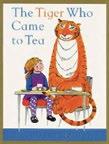
This is a glorious book. It was read to me when I was a child and now I read it to my children, so it has a special place in the circularity of my life. How exciting to have a tiger to tea! It wasn’t scary but magical; a normal day becomes extraordinary thanks to the simple brilliance of Judith Kerr’s story and wonderful drawings. Next year will be the 50th anniversary of the publication of The Tiger Who Came to Tea, so it really has stood the test of time.
Until I read this aged 17, my exposure to the world of espionage had been through action heroes doing daring deeds. How differently Greene paints the
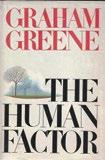
world of the British Secret Intelligence Service and politics. The protagonist, Castle, lives a seemingly dry and mundane life working in the MI6 offices, getting the same train and having his lunch in the same pub every day. There’s so much more beneath Greene’s characters than you anticipate. I started to look a bit differently at the people around me…
I read this when it was first published in 2001, and I thought it was astonishing how le Carré could write about such complex times and political situations with absolute success. This is based on a real-life case of murder and corruption in Africa, and most chilling of all is the note le Carré writes in the afterword: “By comparison with the reality, my story is as tame as a holiday postcard”. As told to Caroline Hutton

Win £50 for your true, funny stories! Go to readersdigest. co.uk/contact-us or facebook.com/readersdigestuk
AS A BRIT WORKING in California during the early 1990s, I encountered several Americans who “just loved” my accent.
I was particularly tickled by one young woman who complimented me—when informed that I came from Scotland—with, “Wow, your English is really good!”
MARY MCPHAIL, AberdeenshireI TOOK MY SON TO SEE the new Power Rangers film. We had a bit of trouble parking and got in just after the credits. The storyline was a lot darker than the previous films, with a young boy lost and scared in the big city.
I reassured my son that we’d soon see the boy discover his mighty morphin’ superpowers. That’s when somebody pointed out that we were in the wrong cinema and actually at a screening of Lion.
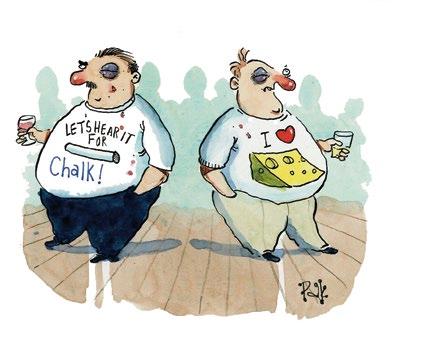
delighted that I told all my friends and family.
JOHN BYRNE, HertfordshireI RECENTLY WON a competition, for which the prize was some red wine, cheese and a box of crisps. I was so
A few weeks later I received a large parcel, but thought it was strangely light. When I opened it, it contained 12 packets of crisps. I began to throw them up in the air looking for my wine and cheese when my heart sank. The crisps were cheese-andwine flavour! My friends and family still often bring the subject up…
LEE HALL, KentAS MY FOUR-YEAR-OLD hates her hair being brushed, it takes a lot of cajoling to get the job done.
One day after her bath, while sitting at my dressing table with a wide-toothed comb and a bottle of detangler at the ready, I said, “Let’s look at your lovely face in the mirror.” She shook her head.
When I asked her why not she replied, “Because it’s glaring at me!”
UNA DOHERTY, Galway
MY HUSBAND LEFT A NOTE for the office cleaner because he’d noticed the firm’s trophy cupboard was getting quite dusty. The note read, “Check out the trophies”.
The next day he found it still very dusty with a note added from the cleaner, “Yes, they’re lovely trophies!”
ABIGAIL GEORGE, Wrexham County
I WAS DRIVING in the country with my seven-year-old daughter when she spotted some sheep that had been spray-painted for identification.
“That’s horrible,” she said, earnestly. “I can’t believe someone’s done graffiti on those sheep.”
EMMA GRATKOWSKA, Staffordshire
MY FRIEND JACK had a crush on a religious woman and saw his chance to impress her when she asked him his favourite Bible verse. At random, he confidently chose, “Psalm 38:5.”
Little did he know that it read, “My wounds stink and are corrupt because
of my foolishness.” He wondered why she wasn’t interested!
CATHERINE HISCOX, Hertfordshire
PACKING FOR OUR anniversary trip to Venice, my wife took me to task over my smartest pair of trousers— perfect for posing in St Mark’s Square, except for the missing fly button.
“Fix them,” she ordered, “the button’s on the table.” I hadn’t wielded needle and thread for years, but threw myself into the task.
After four attempts, and multiple self-inflicted wounds, I succeeded— only to find that the new button wouldn’t fit through the hole. It was the wrong one.
JEREMY DAVIES, Hertfordshire
I WAS IN THE CHEMIST’S when I overheard a German tourist politely ask the shop assistant for some help. “I want a treatment to keep the midgets away.”
There was a stunned silence before the assistant thought quickly. “Ahhh, you mean midges?” She swiftly directed the lady towards the insect sprays. CAROL MACLEAN, Argyll and Bute
RECLINING ON A SUN LOUNGER on a glorious, cloudless day by a popular beach in Kefalonia—and looking towards the island of Ithaki—my sister-in-law felt compelled to shout out, “The view between my legs would make a fantastic postcard”
GREGORY THEN, by email
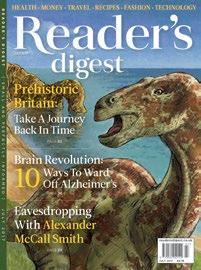


YES I want to subscribe to Reader’s Digest Magazine for just £3 for 3 issues (a saving of £8.37 on the shop price of £11.37 based on the cover price of £3.79 per issue). I understand that if I do not wish to continue receiving Reader’s Digest after my first 3 issues I can simply cancel my subscription by contacting customer services. If I do want to continue to subscribe after my first 3 issues I need do nothing and my subscription will automatically be renewed at the low rate of £4.99 for every 3 issues until I decide otherwise.

it pays to increase your
When it comes to wordsmiths, Scrabble players tend to be the cream of the crop. These words, taken from The Official Scrabble Players Dictionary, will test even the most seasoned players. “Qi” and “za”, anyone? Answers on the next page.
By Emily Cox & H E nry r at H von1. mores n —A: places for boats to anchor. B: customs. C: type of eel.
2. snarf v —A: to wrap around. B: sneeze loudly. C: eat greedily.
3. hinky adj —A: highly strung. B: very wealthy. C: suspicious.
4. jiggy adj —A: weak-kneed.
B: devious. C: pleasurably excited.
5. haimish adj —A: homey. B: hesitant. C: harmful.
6. scrunchy n —A: folding chair.
B: hair holder. C: open-toed sandal.
7. trog n —A: hooligan. B: tree frog. C: ancient beverage.
8. bilby n —A: small mammal.
B: mesh visor. C: tall hedgerow.
9. delish adj —A: irritable when hungry. B: delicious. C: saturated with fluid.
10. cred n —A: credulity. B: credibility. C: credit.
11. magalog n —A: magazinecatalogue hybrid. B: high-speed train. C: holiday diary.
12. linguica n —A: type of bacteria. B: Spanish dialect. C: type of sausage.
13. echt adj —A: genuine. B: artificial. C: superior.
14. doula n —A: flannel. B: childbirth helper. C: part of the human brain.
15. barista n —A: solicitor.
B: prison guard. C: one who makes and serves coffee.
1. mores —[B] customs of a particular group. “She lived in Paris for years but couldn’t get used to the French manners and mores .”
2. snarf—[C] to eat or drink greedily. “After playing football, the children tended to snarf their supper.”
3. hinky—[C] suspicious. “I’m telling the truth, so I don’t know why you’re acting so hinky.”
4. jiggy—[C] pleasurably excited. “Whenever I hear that song, I get jiggy.”
5. haimish—[A] homey, unpretentious. “Their house has a nice haimish quality to it.”
6. scrunchy—[B] elastic band for fastening hair. “When tidying my daughter’s bedroom, I pick up one scrunchy after another.”
7. trog—[A] hooligan. “Please don’t act like such a trog when we have guests.”
8. bilby—[A] small, nocturnal mammal. “A bibly isn’t a good choice for a pet.”
9. delish—[B] delicious. “I marvel at your cooking skills— that meal was one of the most delish I’ve ever had.”
10. cred—[B] credibility. “It’s taken me a long time to build up some cred with these people, so I don’t want you doing anything that might my damage my reputation.”
11. magalog—[A] sales catalogue resembling a magazine (or vice versa). “I’d rather flip through a magalog than actually go shopping.”
12. linguica—[C] spicy Portuguese sausage. “The key ingredient in great gumbo is fresh linguica .”
13. echt —[A] genuine. “She has lots of echt qualities that I value in a friend.”
14. doula—[B] woman who assists another in childbirth. “For this baby, my wife and I decided to go for as much help as we can get—a doctor, a midwife and a doula.”
WorD oF tHE Day*
oBamBUlatE
to walk around or wander.
alternative suggestions:
“What an american expresident does when he takes his child out in a pram.”
“When you get up late and rush around like a bull in a china shop.”
15. barista—[C] one who makes and serves coffee to the public. “If you can’t tell an americano from a long black, I’m afraid you you’ll never be a successful barista.”
voCaBUlary ratinGS
9 & below: good 10–12: excellent
13–15: exceptional


















Whatever it is, we designed the powerful new Gtech AirRam Mk.2 to make it disappear: The cord that holds you back. Gone. The dust cloud when you empty the cylinder. History. And it weighs just 3.5kg (7.7lbs).
The new AirRam Mk.2 outperforms the original in every test, with cleaning performance proven on both carpet and hard- oors. And you can still glide from one to the other with no settings to change. The AirRam Mk.2’s powerful rotating brush bar also makes it ideal for pet hair, even lifting troublesome embedded hair from your carpet.
The new LED searchlights mean there’s now no place for dirt to hide.
The new AirRam Mk.2 is equipped with Gtech’s patented† AirLOC system. It effortlessly picks up larger objects, but is uniquely designed to also lift dust and ne debris, leaving your oor pristine.
The new AirRam Mk.2 collects the dirt into the head of the vacuum, moving it just 4cm before compressing it into the unique snail-shell bin. This compression technology gives the AirRam Mk.2 enhanced dirt storage capacity. You can then eject this tubular bale straight into the bin with a satisfying slide of the dirt ejector arm.
Thanks to its revolutionary design, which does away with so many bulky parts, the AirRam Mk.2 weighs just 3.5kg (7.7lbs). The AirRam Mk.2’s edge cleaning technology helps you get into those awkward corners and makes it great for cleaning the stairs.
AirRam Mk.2’s 40 minute* run-time gives you the ability to clean two average UK homes on one 4-hour charge. A 1-hour short charge will deliver an additional burst of cleaning time.




















Challenge yourself by solving these puzzles and mind stretchers, then check your answers on p139.
Imagine you have a piece of paper that’s blank on the back with a grid of numbers on the front, as shown. Now imagine doing the following: flip the paper over so the numbers are face down, with the “1” closest to you and on the left. Fold the paper in half horizontally, bringing the bottom edge up to the top so that the blank side is inside the fold. Turn the paper 90 degrees clockwise. Fold the paper in half the same way as before: bottom to top. Make the same fold yet again without rotating the paper. Then turn the paper 90 degrees clockwise and make the same fold one last time. The finished packet shows only one number. Which one? (For an easier version of this puzzle, manipulate a real sheet of paper.)
For a charity fund-raiser, five friends decided to knit socks non-stop, with one person knitting at a time for five-hour shifts. They started at 9am and, after they each took the same number of turns at knitting, it’s now several days later at 1pm. What’s the fewest number of shifts each participant could have taken?
On the left side of a balance scale sits a brick. On the right side, there’s a two-thirds-of-a-kilogram weight and two-thirds of another brick of the same type. The scale is balanced. How much does the left brick weigh?
tiltinG tripods
The three-dimensional object portrayed on the left is perfectly symmetrical: four arms extend from the centre so that the overall shape is a triangular pyramid. The image on the right shows the same object, just in a different orientation. True or false?
BiG CoUnt
Which number is next in the sequence?
£50 prize qUestion
answer published in the october issue
What shape should be in the top brick? 0
the first correct answer we pick on august 30 wins £50! email excerpts@readersdigest.co.uk
answer to aUGUst’s prize qUestion
d. each line contains two blue dice and one purple die. each line contains a two, a three and a five. the missing image is of a blue die, number three.
and the £50 Goes to… lauren krotosky, hertfordshire
Brainteasers: Answers
BaCk to the Fold: 13.
aroUnd the CloCk: After each person has taken one shift, it’s 25 hours later, so the time on the clock is one hour later. Therefore, they’ve each taken four shifts (and it’s four days later).
BalanCinG BriCks: 2 kilograms.
tiltinG tripods: True. Imagine pushing the red ball so that the object tips over the edge formed by yellow and blue.
BiG CoUnt: 56,687,000. Each number is equal to the previous number multiplied by two, plus 1,000.
Win £50 for every reader’s joke we publish! Go to readersdigest. co.uk/contact-us or facebook.com/readersdigestuk
TWO MEN ARE STUCK on opposite sides of a river. The first man shouts to the second, “How do I get to the other side of the river?”
The second man shouts back, “You are on the other side!”
SEEN ONLINE
AMERICAN SONG LYRICS always confuse me. One goes, “I’ve got soul, but I’m not a soldier.”
On the face of it, it sounds pretty
HIS DAYS WERE NUMBERED
cool, but then you analyse it and realise it’s just meaningless rubbish.
It’s like saying, “I’ve got ham, but I’m not a hamster.”
Sing along everybody! “I’ve got ham, but I’m not a hamster…”
COMEDIAN BILL BAILEYWHY DIDN’T THE LIFEGUARD save the drowning hippy?
He was too far out, man.
SEEN ONLINE

...is the number of years Scott Ludlam served as an Australian senator before he realised he was actually born in New Zealand. He apologised but assured his fans he’d find “other ways to cause trouble”.
Source: UPI.com
MY FRIEND’S BUTLER’S left arm is missing—serves him right.
COMEDIAN TIM VINEA BOY WAS HAVING a lot of difficulty in his French classes. To encourage him, his teacher said, “You’ll know you’re really beginning to get it when you start dreaming in French.” One day, the boy excitedly ran into class and said, “Sir! I had a dream last night and everyone was talking in French.”
“Great,” said the teacher. “What were they saying?”
“I don’t know,” the boy replied. “I didn’t understand a word of it.”
GRAHAME JONES, LondonI ALWAYS USE LAUGHTER as a defence mechanism.
These tombstones show that some people really do die laughing (as seen at ranker.com).

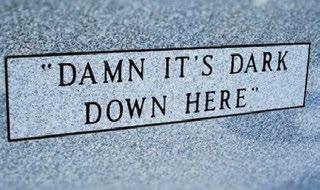 COMEDIAN TOM SMITH
COMEDIAN TOM SMITH
Turns out it’s a terrible way to stop a mugging.
I’M NOT A FAN OF CONFLICT. If I feel like I’m about to get into an argument with someone, or some kind of disagreement, I just say, “Look, we’re good, it’s cool, don’t worry about it.”
And then I take the high road by quietly resenting that person for the rest of my adult life.
COMEDIAN MATT HYAMSWHAT DID SEAN CONNERY say when his books fell on his head?
I’ve only got my shelf to blame.
SEEN ONLINE
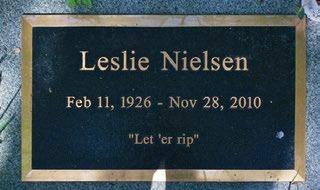
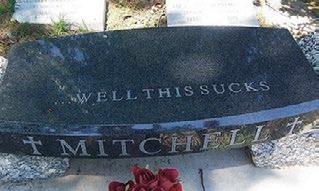
I MATCHED WITH SOMEONE on a dating site who said her two favourite things in life were puns and Lord of the Rings.
I messaged her saying, “Damn girl, could you be Mordorable?”
COMEDIAN ANTONIO AGUILARI LOST MY WATCH at a dance recently. I assumed that I’d never find it again, but I decided to give it a try anyway.
Sure enough, I did find it—but there was a man standing on it. The worst part was that he was being very handsy with the woman next to him.
When she made it clear she wasn’t interested, he tried to slap her.
That’s when I intervened, because you don’t hit a woman. Not on my watch.
COMEDIAN FOAD HP
I BOUGHT A NEW TELEVISION—it’s a projection screen.
I’m really worried my father doesn’t love it.
SEEN ONLINE
I DON’T WATCH SPORTS, so my idea of “Fantasy Football” would just be a bunch of strikers lining up to apologise for being mean to me at school.
SEEN ONLINE
GOOGLE EARTH IS AMAZING. They photographed every road in the world. All you have to do is type in the address online and you can go there immediately.
You sit in front of the computer and think, I can go anywhere in the world. Where shall I go? But we all come to the same conclusion…MY HOUSE!
COMEDIAN MICHAEL MCINTYREYOU’RE FIRED!
The people of Twitter reveal the reason they lost their last job using the hashtag #WhyIGotFired:
@305Pirate: “Called in sick to go to a Who concert. My picture ended up on the front page of the paper—it was hanging in the office the next day.”
@4LeftTurns: “My friend cleaned all the fish tanks in the pet department with Windex. The inside of the fish tanks. All the fish died.”
@imjoeyray: “An hour into my first shift at the Nike store, my manager pointed out that I was wearing an Adidas t-shirt.”
@Frozen_Gumwad: “I worked at a call centre and would use fake accents to keep it interesting. They really do monitor the calls for training purposes.”
We chatted to puppet-master
WHAT’S YOUR FAVOURITE OF YOUR OWN JOKES?
When I say to my puppet, “Sam, would you not talk when I’m talking please?”
He replies, “Don’t worry Paul, you’re not that good.”
HAVE YOU FOUND PARTS OF THE WORLD FUNNIER THAN OTHERS?
British audiences are harder to impress. In America, they go nuts before you’ve done anything. I want to say, “Alright, calm down. Let’s see what I can do before you get hyped up.” I prefer having to prove myself.

ANY MEMORABLE HECKLES?
I was doing a private function in someone’s garden and their dog wouldn’t stop barking. I was heckled by that dog for a good half an hour.
WHAT’S YOUR FAVOURITE ONE-LINER?
Bob Monkhouse said, “When I told my friends I wanted to be a comedian, they all laughed. Well, they’re not laughing now…”
WHO’S YOUR INSPIRATION?
Frank Oz and Jim Henson—I was majorly influenced by anything to do

with The Muppets as a boy. Ray Allen always inspired my ventriloquism.
IF YOU WERE A FLY ON THE WALL, WHOSE WALL WOULD YOU BE ON?
I’d be on the wall at Pinewood Studios to watch how they’re building the creatures for the new Star Wars films.
IF YOU COULD HAVE A SUPER POWER, WHAT WOULD IT BE?
I love aviation, so I’d like to be able to fly like Superman.
Paul will be touring his new show All Mouth across the UK from September 9. For more information, visit paulzerdin.com

Think of a witty caption for this cartoon—the three best suggestions, along with the cartoonist’s original, will be posted on our website in midSeptember. If your entry gets the most votes, you’ll win £100
Submit to captions@readersdigest.co.uk or online at readersdigest.co.uk/caption by September 15. We’ll announce the winner in our November issue.

Our cartoonist’s caption, “Have you tried coaxing it down with some breadcrumbs?” impressed only 16 per cent of voters this month, coming in third. The winner, on the other hand, received nearly four times as many votes, finding favour with 60 per cent of the readers. We love the ingenuity and mild sarcasm of his caption: “Well, you said you wanted a house with two more wings.” Well done, Paul Gillon!

The musicianturned-reverend on finding peace.

• Do You Want to Live Forever?
• Best of British: Halloween
• Photo Competition Winners! “I





SEBO is a world leader in professional vacuum cleaners, meaning we know all about making durable, high quality machines that clean exceptionally well and are designed to work. In fact we do such a good job that many flooring manufacturers only recommend SEBO.
For a chance to win a SEBO vacuum cleaner, enter our monthly draw at: www.sebo.co.uk




So, if you want to upgrade your vacuum cleaner, choose the brand used by professionals – SEBO.


